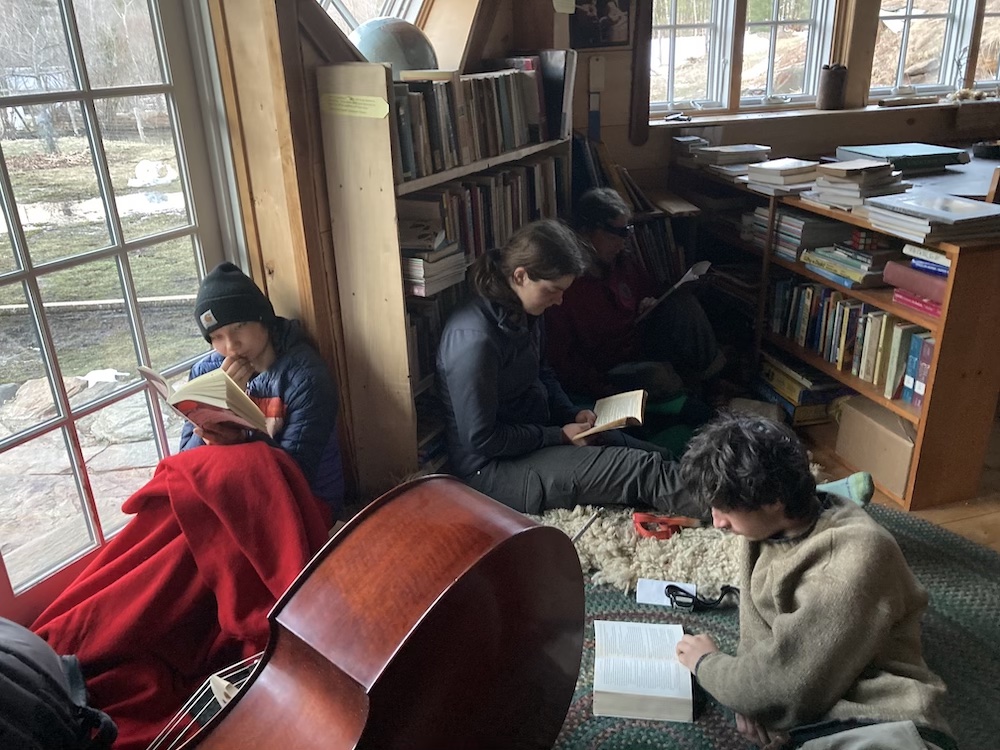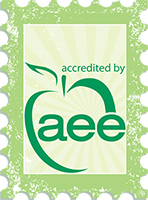2024 Full Circle Winter Semester Blog #4
We have spent the last four weeks living, learning and working at Maine Local Living School, home of the Knapps. Our first day was simply a decompress, where we were set loose to wander the still-snowy woods. Many of us chose a spot to contemplate, or nap, or both.
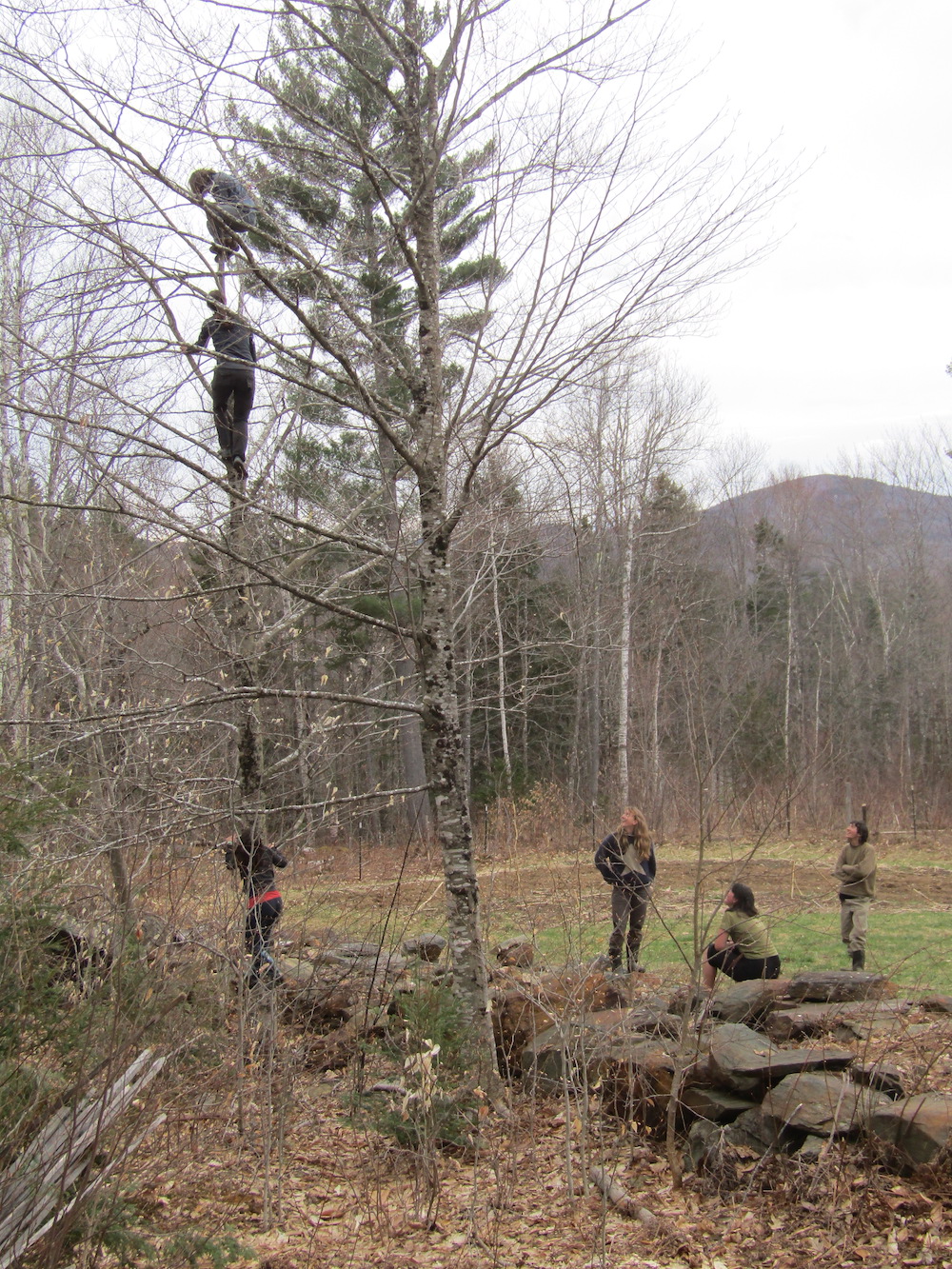 Then we plunged into the whirlwind of de-issue, emptying every bag, box and nalgene we had. Pots left in unspeakable condition from solos were scrubbed, many a gaiter was retired, and we had plastic bags to wash for days.
Then we plunged into the whirlwind of de-issue, emptying every bag, box and nalgene we had. Pots left in unspeakable condition from solos were scrubbed, many a gaiter was retired, and we had plastic bags to wash for days.
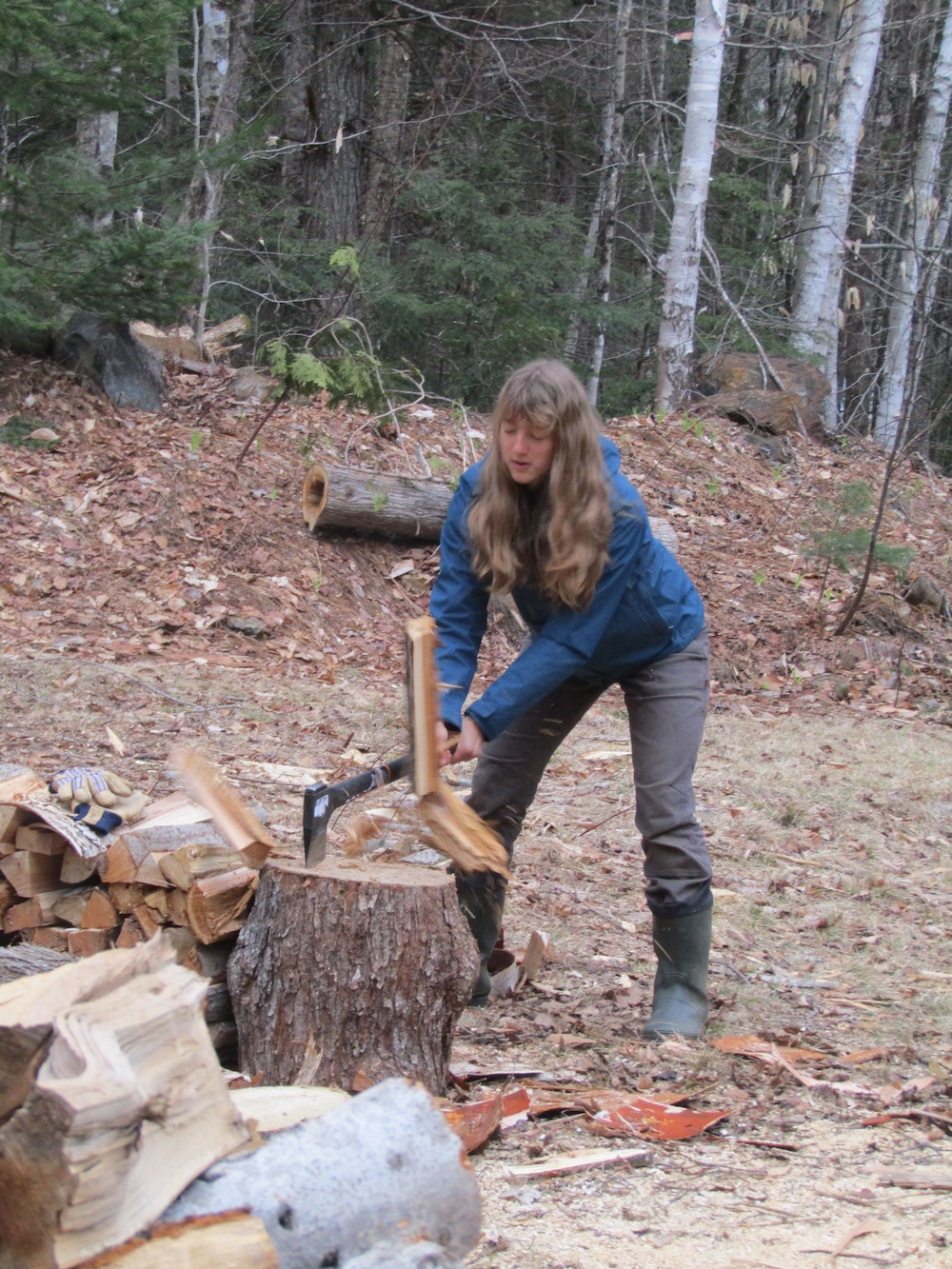
Aria splits wood
We met a slew of new people in our time at MLLS. When we arrived we met the Knapp family: Of course we knew Chris, and we were thrilled to meet Ashira, his wife, and Pamela, his daughter, both of whom we had heard many stories about, had the familiar tough-as-nails Knapp look in their eyes, and welcomed us into their home with grace and warmth. We met Caleb, the gentlest soul you will ever see, and his puppy, Bear. We were able to see Nick in his natural habitat, navigating the places and systems that were so new to us with ease. In our first days at the school a group of paddle makers from the local high school finished their paddles downstairs while we wrote our reflections from winter up in “Heaven,” the name for the cozy 3rd floor of the MLLS classroom.
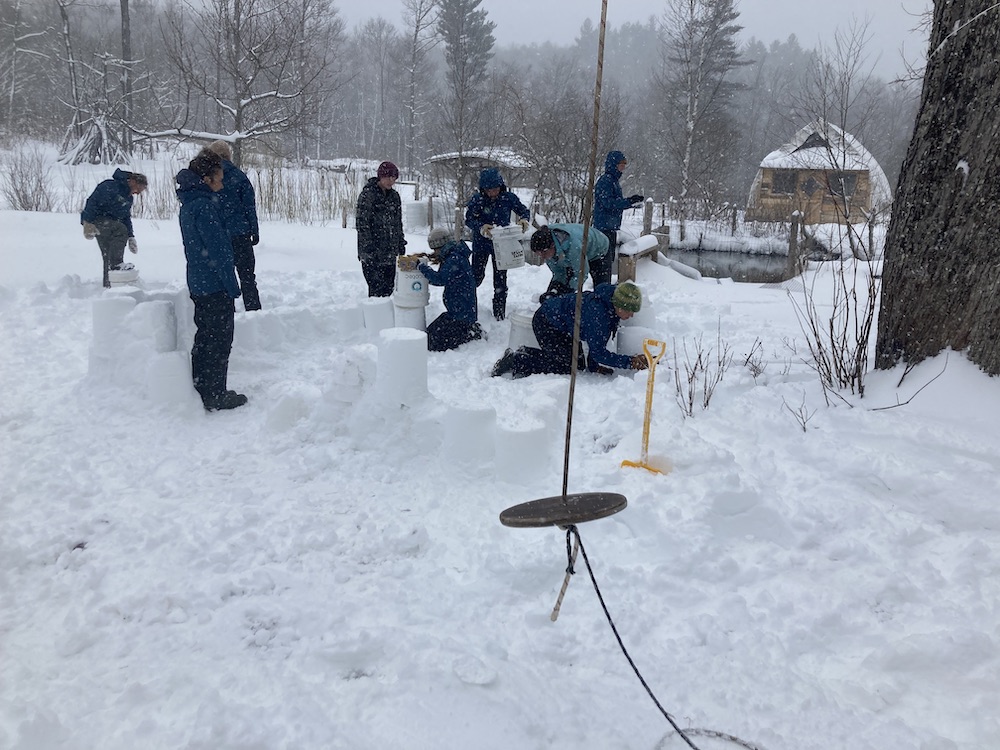
And then it snowed!
We were able to share stories and connect a little with the paddle makers, who, although in a different program, were also teens who had chosen outdoor education as a path through high school. Arriving auspiciously in a van-needing-to-be-pulled-out-of-the-mud was Natasha Rose Diamondstone-Kohaut, or Tashi, who joined to teach the group and learn some about homesteading herself! Her sage questions and advice would take us far.
After decompression and deissue, we started to prepare for the upcoming Parent Weekend. Chris became our theatrical director, shaping the skit. At last a frantic tidying of the campus took place, and before we knew it, Parent Weekend was upon us!
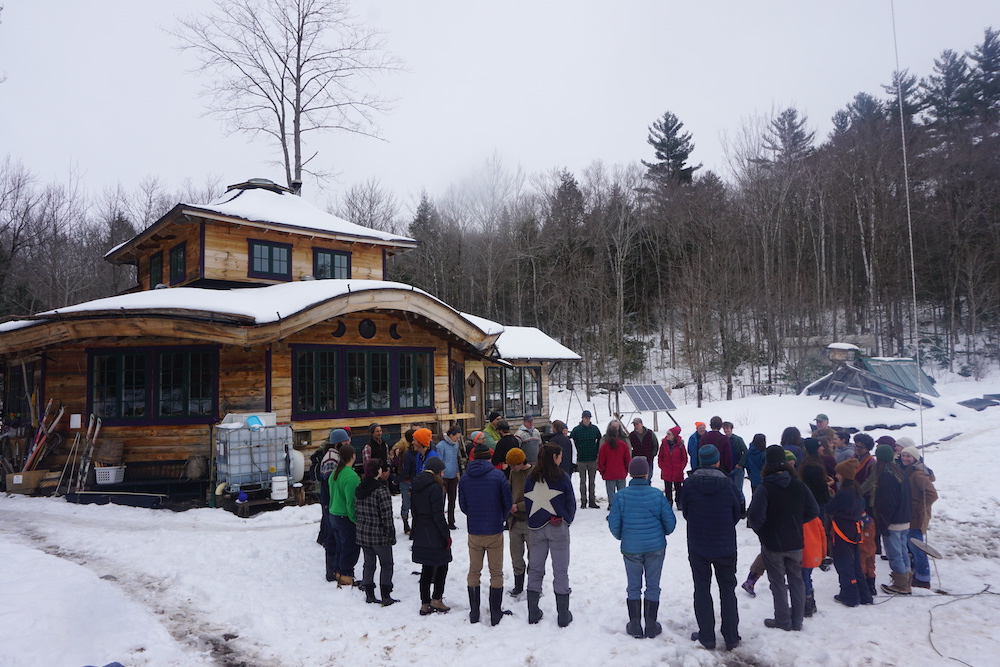
Parent Weekend welcome circle
It was a lovely weekend, full of joyful reunions and many tears. We were all able to see where our semester-mates came from, which funny habits or affectations they picked up from their folks, or simply how much they resembled them. We had an amazing contra dance, called by the legendary caller (and godfather of Cole) John McIntire.
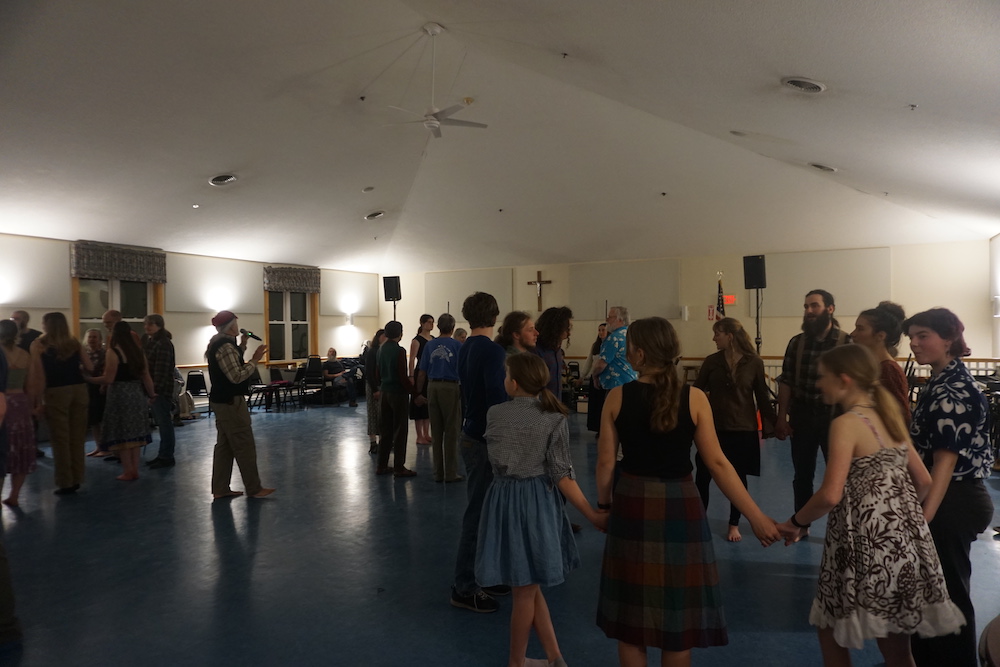
Parent Weekend Contra Dance
And the food! Many guests brought meals for the potluck. Sumptuous servings of chicken soup, piled-high platters of pancakes, brimming bowls of bean salad, and so many more delicious dishes. At the end of the weekend, we said goodbye to our parents, grandparents and siblings. Thank you to everyone who came for all of the love, food, and manual labor! It was such a gift to have all of you here with us.
We said goodbye to our instructors Sam and Rebecca for the duration of our stay here. We would miss their joy and guidance, but we’d see them again in a few weeks!
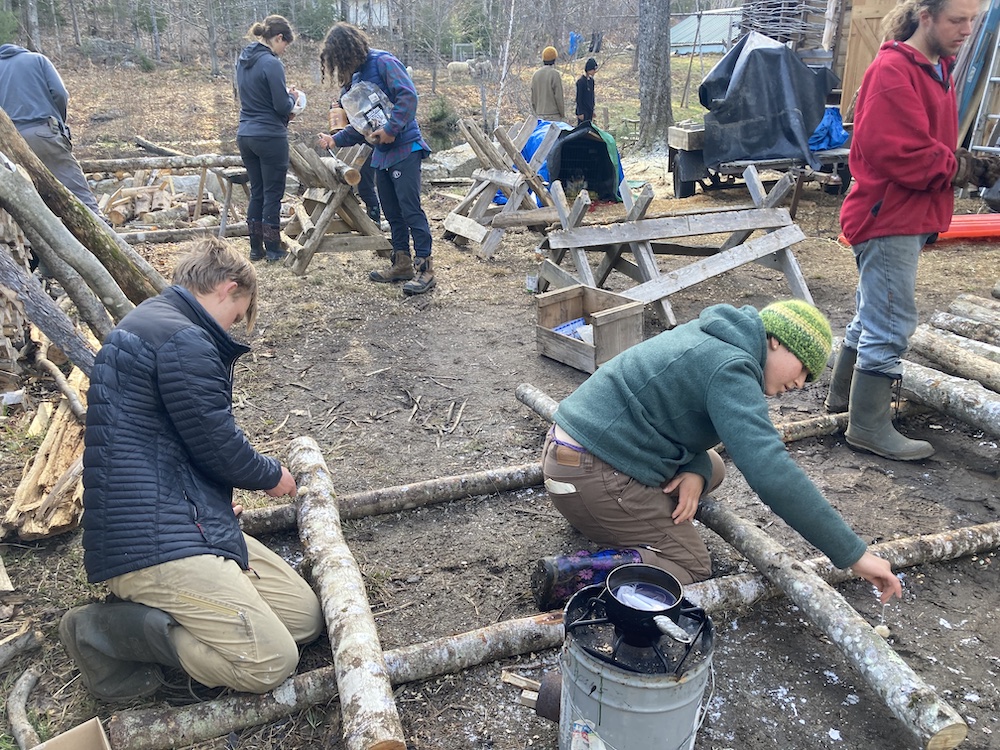
Mushrooms!
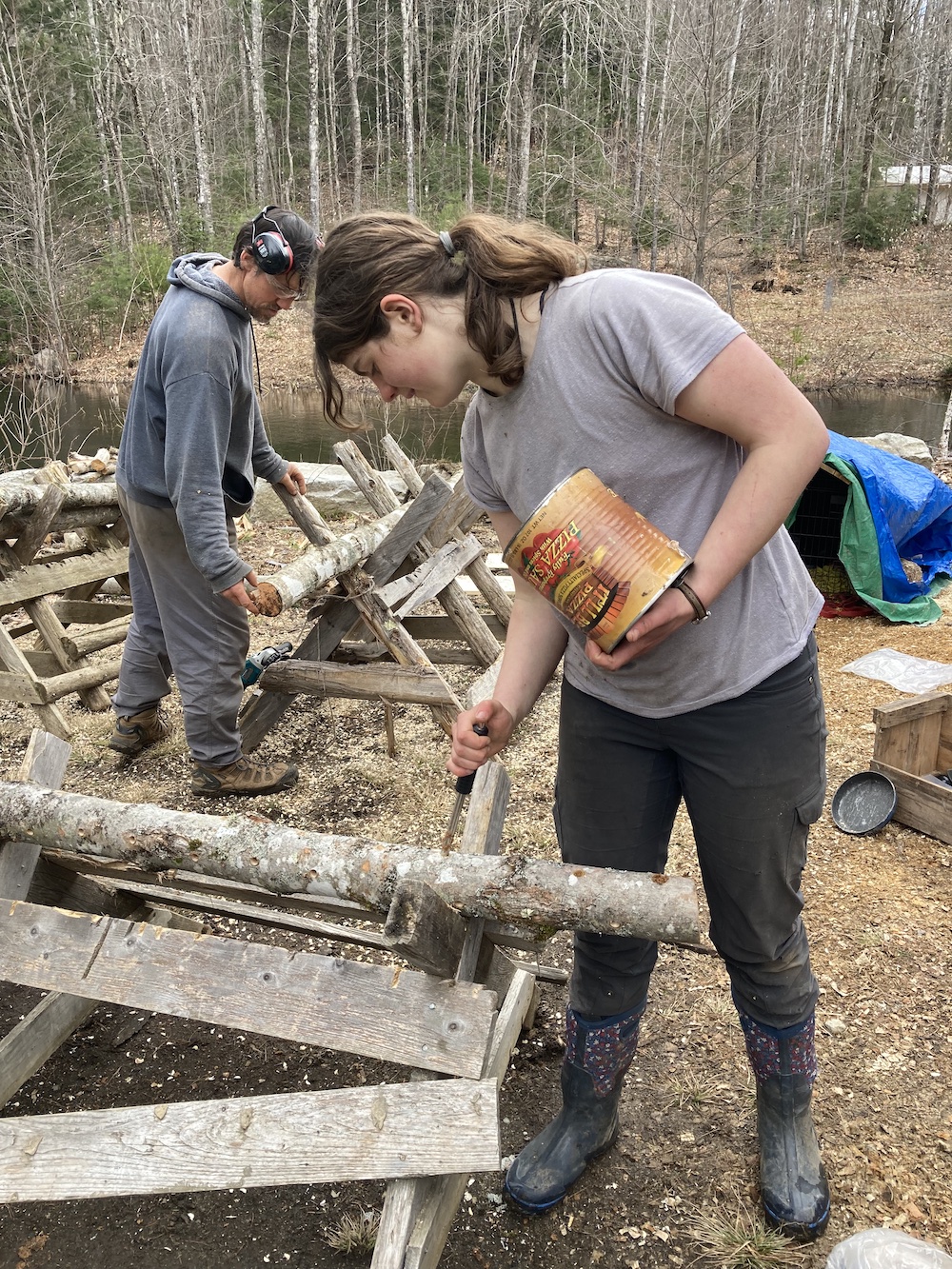
Lily inoculating logs with mushrooms
___________________________________________________________
Eclipse
On the 8th of April, a remarkable phenomenon occurred: the solar eclipse. We marched up a relatively small mountain named Tater Mountain, a short bike ride northwest of MLLS. We reached the top, which was the perfect spot for a viewing. Very slowly the sun began to disappear. There was an immense feeling of awe and a little fear. The shadows under the evergreens became little crescents, changing to match the current shape of the sun.
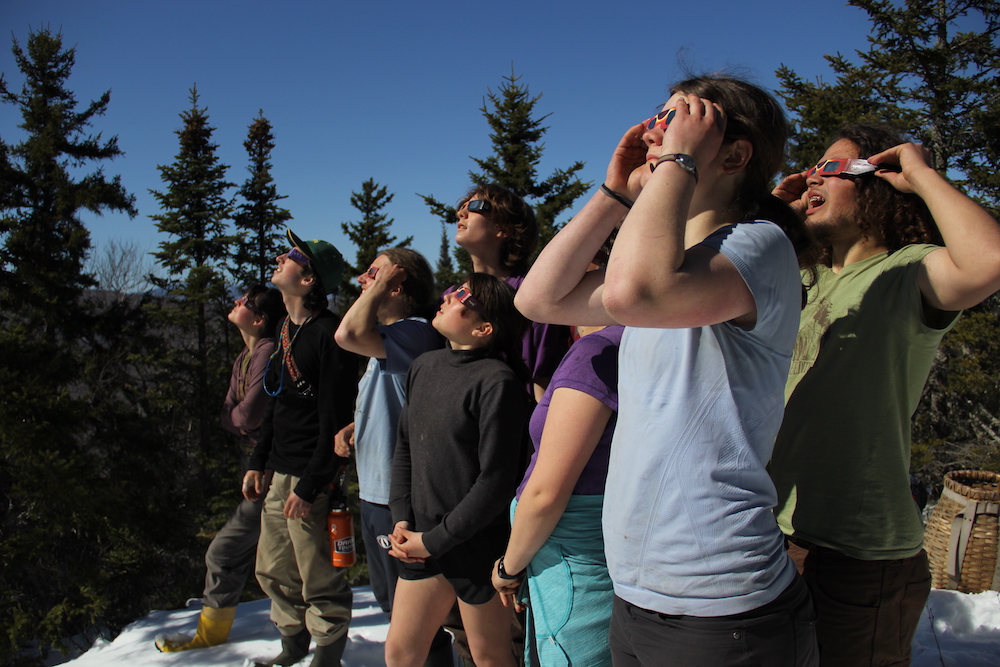 As the sun was literally vanishing before our eyes, I personally felt as though I was on the earth no longer, I had been transported to some alien place that I didn’t quite understand. The mountains were being shrouded in a blanket of black, a few stars twinkled in the sky. Then as the light returned strange striations of sunlight moved across the snow like waves. We were all perplexed and had no clue what they could be. In some mythologies the eclipse would have signaled the end of the world. It felt that way for a moment, then it was gone and light and familiarity returned to the earth.
As the sun was literally vanishing before our eyes, I personally felt as though I was on the earth no longer, I had been transported to some alien place that I didn’t quite understand. The mountains were being shrouded in a blanket of black, a few stars twinkled in the sky. Then as the light returned strange striations of sunlight moved across the snow like waves. We were all perplexed and had no clue what they could be. In some mythologies the eclipse would have signaled the end of the world. It felt that way for a moment, then it was gone and light and familiarity returned to the earth.
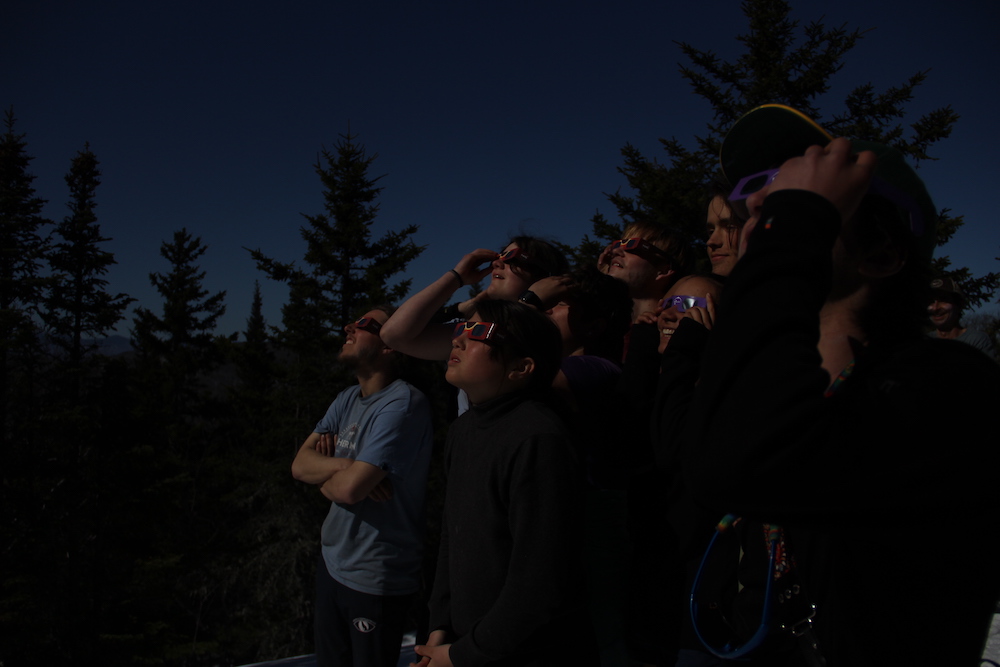 ___________________________________________________________
___________________________________________________________
Augusta
The very next day, we all piled in the van to head to Augusta, Maine’s capital. We had a new purpose: the Kroka Full Circle Semester was taking action! We were there for the Maine Youth Day of Action and to promote the Maine Outdoor School for All bill, LD1817, which, if funded, will give all Maine public school students a 3-day outdoor education experience, immersing in nature at one of several outdoor schools in Maine, including MLLS.
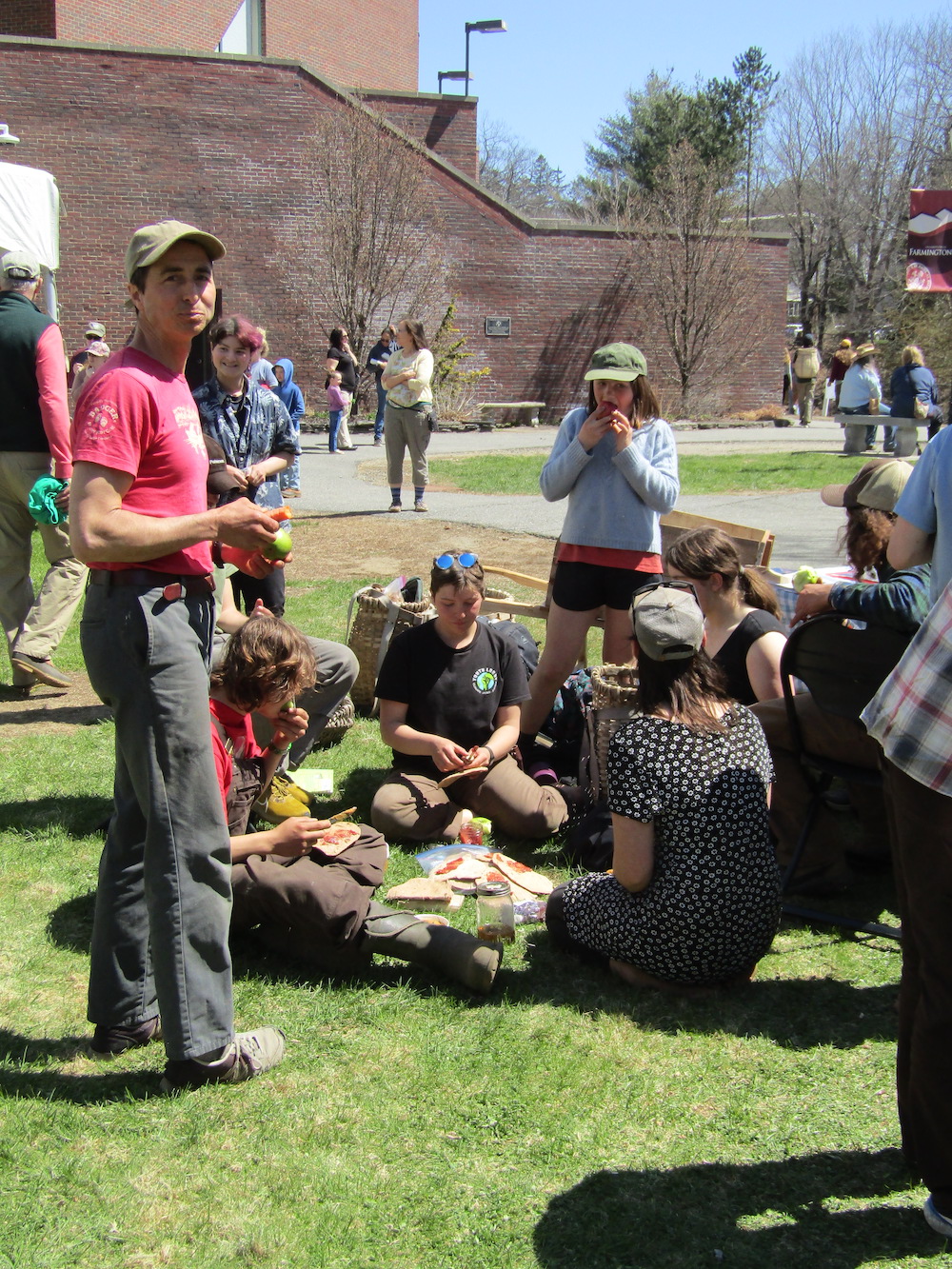 It was jarring to be in a place with so many other people, especially of our own age. It felt like we stood out, with our practical clothes and quiet presence (I know what you’re thinking, “This group, quiet?”, but it was true here!). There was a “rally” where there were several youth speakers who gave speeches, read poetry, and led chants. After, there were panels on climate activism and climate careers. The group split up to attend both.
It was jarring to be in a place with so many other people, especially of our own age. It felt like we stood out, with our practical clothes and quiet presence (I know what you’re thinking, “This group, quiet?”, but it was true here!). There was a “rally” where there were several youth speakers who gave speeches, read poetry, and led chants. After, there were panels on climate activism and climate careers. The group split up to attend both.
For the lobbying portion, we entered the statehouse, encountering a slight hiccup when Cole put his pack basket through the metal detector, forgetting that he had put his (rather large) knife in there. After a discussion with the very friendly security guards, we went on into the Statehouse, making our way past serious people in suits to find the office of Senator Lisa Keim, who we would tell about the bill. Unfortunately, the senate was in session, but we were able to talk to her assistant, who promised to pass our message on. We left feeling accomplished, full of new knowledge, and more than a little bit tired.
 The trip to Augusta was day one of a unit on activism facilitated by Michelle, who now teaches and runs the non profit at MLLS but who previously worked for a decade in climate organizing. Our investigation of activism included: joining a zoom call led by a local organization that is in the process of fundraising for a large affordable eco-housing project in an adjacent town, having lunch with Sue, a woman in her 80’s who has been making change for over 70 years, reading sections of Active Hope, by Johanna Macy and Blessed Unrest, by Paul Hawkins, “mind mapping” a slew of organizations from the state in an effort to see how interconnected social, ecological and indigenous rights issues are, and finally reflecting on the concept of agency, what it is, when we feel it, how to develop it, and why it matters.
The trip to Augusta was day one of a unit on activism facilitated by Michelle, who now teaches and runs the non profit at MLLS but who previously worked for a decade in climate organizing. Our investigation of activism included: joining a zoom call led by a local organization that is in the process of fundraising for a large affordable eco-housing project in an adjacent town, having lunch with Sue, a woman in her 80’s who has been making change for over 70 years, reading sections of Active Hope, by Johanna Macy and Blessed Unrest, by Paul Hawkins, “mind mapping” a slew of organizations from the state in an effort to see how interconnected social, ecological and indigenous rights issues are, and finally reflecting on the concept of agency, what it is, when we feel it, how to develop it, and why it matters.
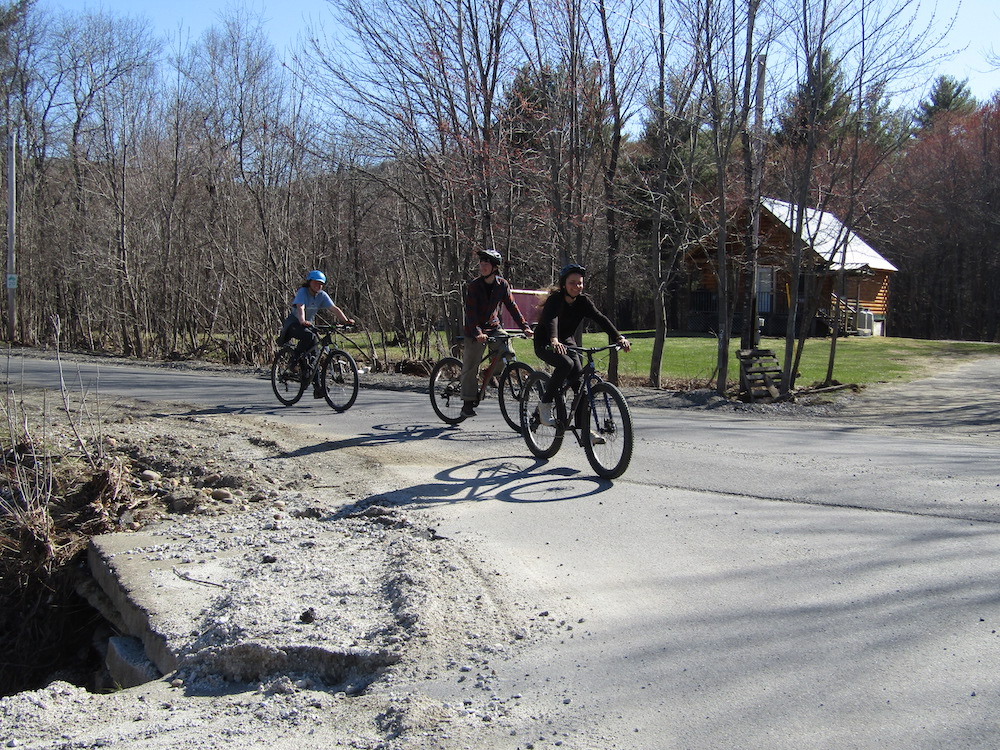 ___________________________________________________________
___________________________________________________________
On April 13th “Professional raconteur and student of the famous storyteller Martin Shaw, Jake lewis, spent an evening with us and brought a generous gift. He told a beautiful, ancient folktale, “The woman who grew back her hands,” with great skill and the flair of a performer” – Lily
From the beginning Jake’s enthralling style of storytelling roped us in; his lively movements and incredible range of voices made every character feel entirely unique. You could get a perfect sense for the deep love harbored for the story he was telling. Then he asked us, “Where are you in this story?” It was amazing how we all felt different attachments to certain characters in his tale, the story, ancient and archetypal, was relevant to all of us. Earlier in the month, Chris had proclaimed the month to be “Say it like it is month.” Somehow the story was also a catalyst for this work, helping us to speak more openly with each other and to lift any and all veils that stood in the way of cohesion, honesty and support for each other. There were A LOT of circles, some tears, and we made progress.
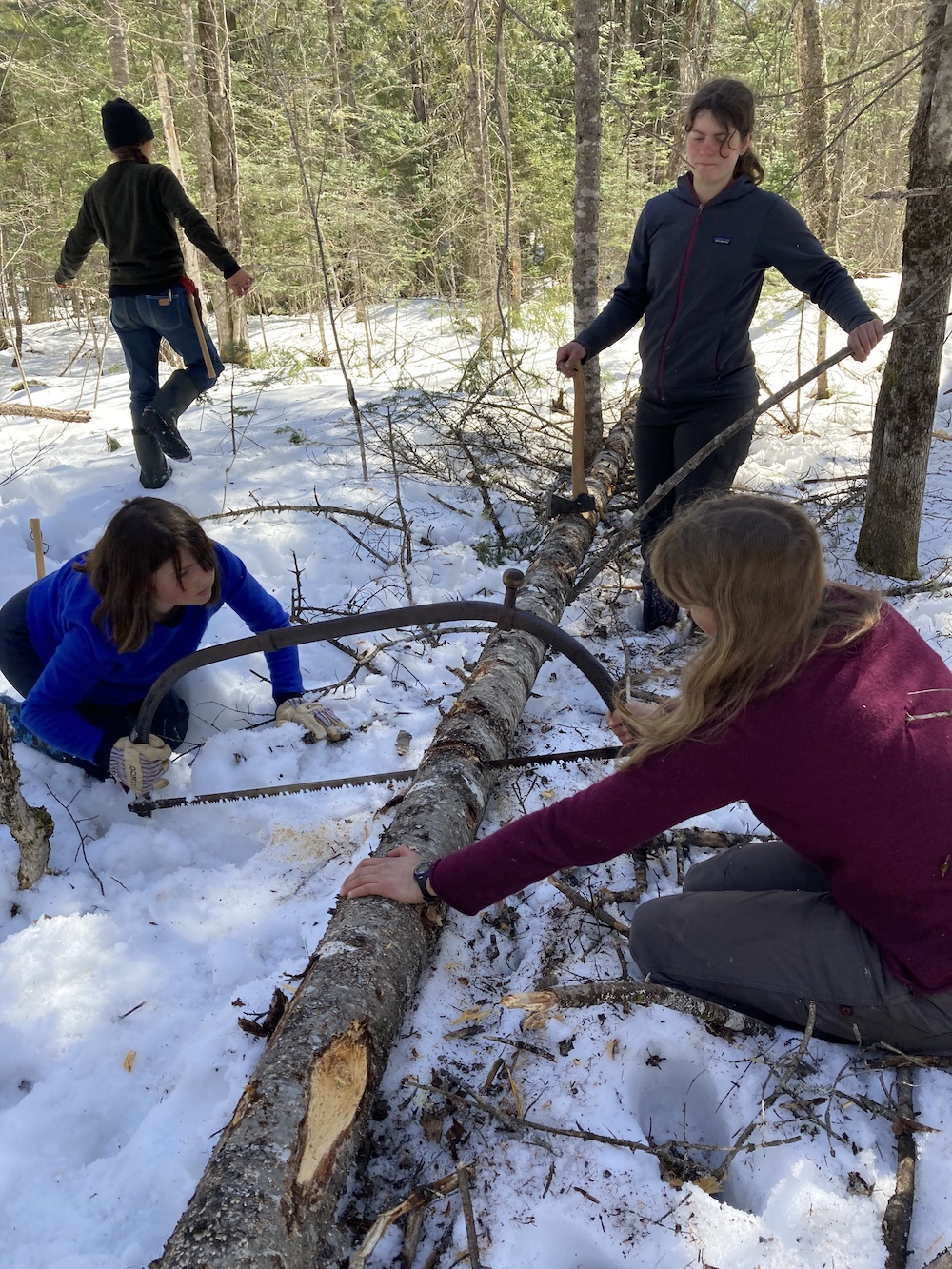 At this point in our journey, we had come a long way and endured much together. We had grown as a group and as individuals, and would continue to do so as we continued on. Sadly, it was at this time that Cole’s path diverged from ours. We bid him a bittersweet goodbye on a Monday morning when the sun was shining, and he drove off with his father and dogs for company. Good luck and fair winds on your own journey, Cole!
At this point in our journey, we had come a long way and endured much together. We had grown as a group and as individuals, and would continue to do so as we continued on. Sadly, it was at this time that Cole’s path diverged from ours. We bid him a bittersweet goodbye on a Monday morning when the sun was shining, and he drove off with his father and dogs for company. Good luck and fair winds on your own journey, Cole!
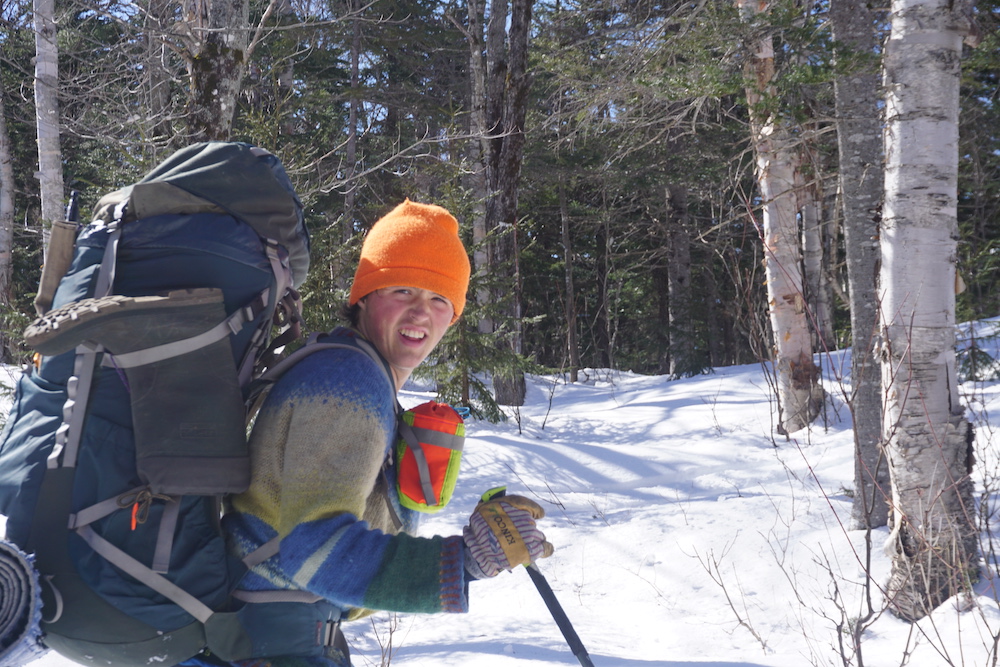
Good luck and fair winds, Cole!
___________________________________________________________
Blog Bonus: What do faeries cook in?
Russel: Hollowed-out acorns
Arnett: Tiny fireplaces in the trees they live in, with a little stone hearth
Ben H: They use magnifying glasses
Addie: They eat sunlight, which doesn’t need to be cooked
Una: They roast food over a fire on a spit or on sticks
Miriam: They eat each other
Lily: Acorn cap pans
Ben S: Geothermal energy
Aria: They hire microbes to be their servants and cook for them
Thomas: quantum energy
Max: They make dragons angry then hold out their food on sticks
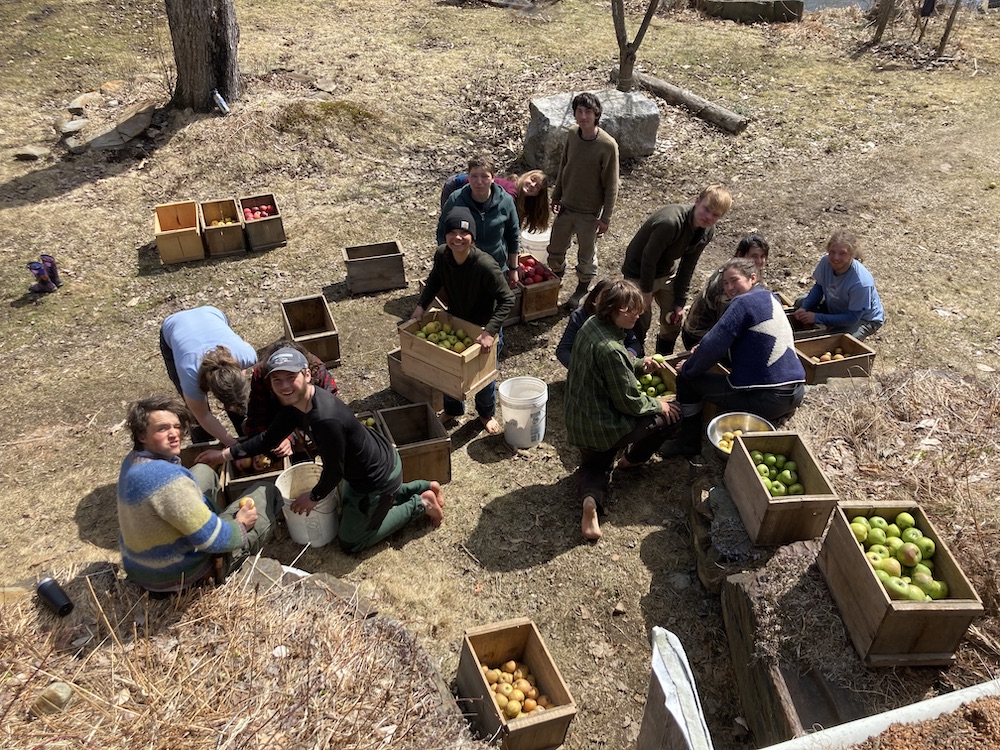 ___________________________________________________________
___________________________________________________________
The time came for us to begin that rite of passage of Winter Semester: Ash baskets! They are modeled after traditional pack baskets invented and used for thousands of years by First Nations from the Great Lakes to the East Coast. The baskets are historically made out of brown ash, a tree which is deeply important to all the tribes of the Wabanaki Confederacy and is, in the Penobscot creation story, the very birthplace of their people.
Since Ash, both brown and white grow too slowly in the rocky acidic soil of MLLS to make good basket splints, we traveled to Earthways, where Grandfather Ray, Chris’s longtime mentor, resides with his wife Nancy.
Chris had regaled us with tales of Grandfather on the winter trail, and as we walked up the long driveway we were all excited to meet him.
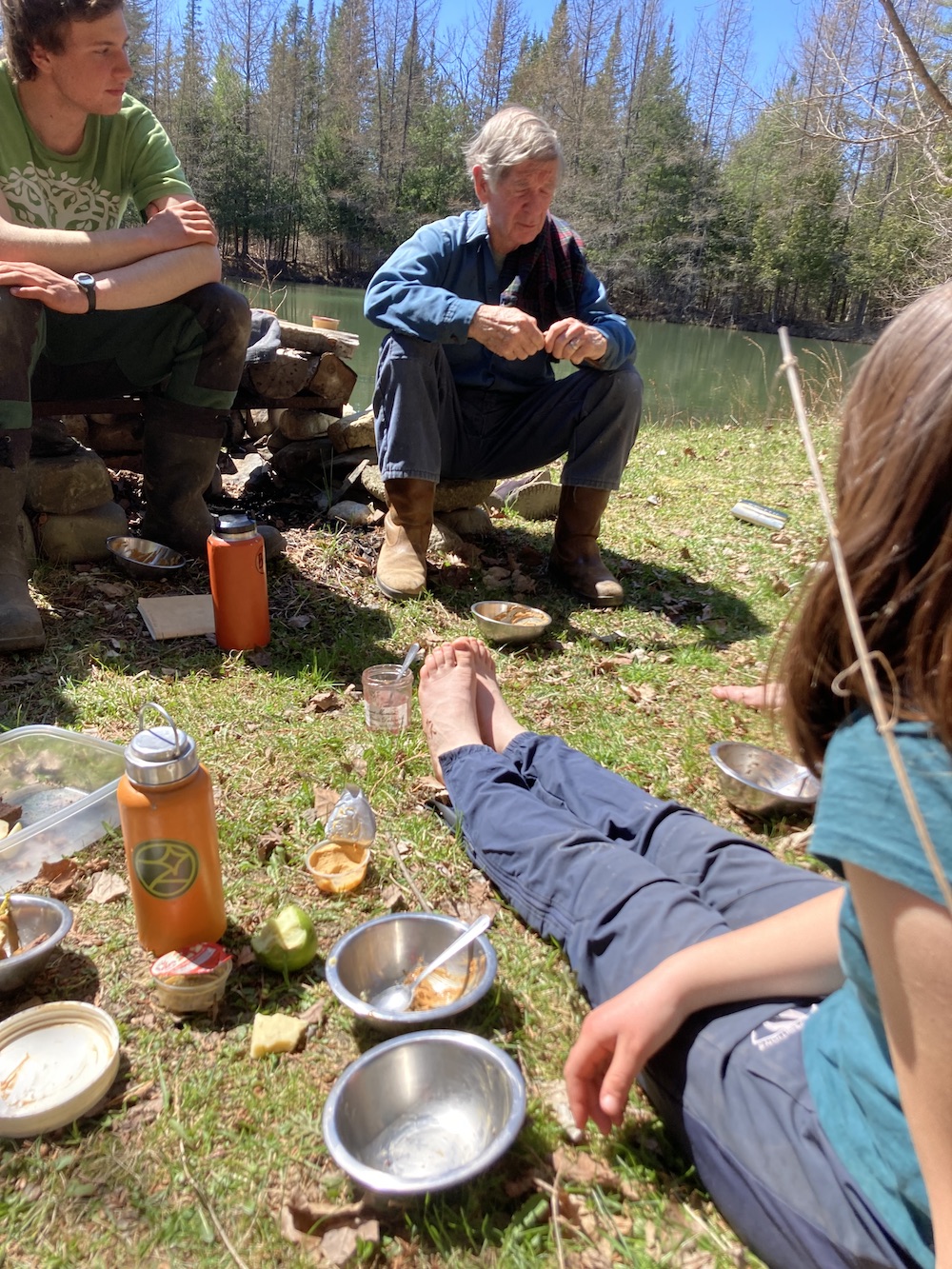
Grandfather
He approached us in a flannel and blue jeans, with a kind, creased face and calm blue eyes. He greeted us all, and we shared names in a circle.
We did some service work on his gorgeous land, and at lunch got the opportunity to sit and speak with him. To meet the mentor of our mentor was captivating. His gentle wisdom and teachings were at times difficult to digest, with so many new thoughts and ideas to process. He had so many experiences in the world, so many things to share.
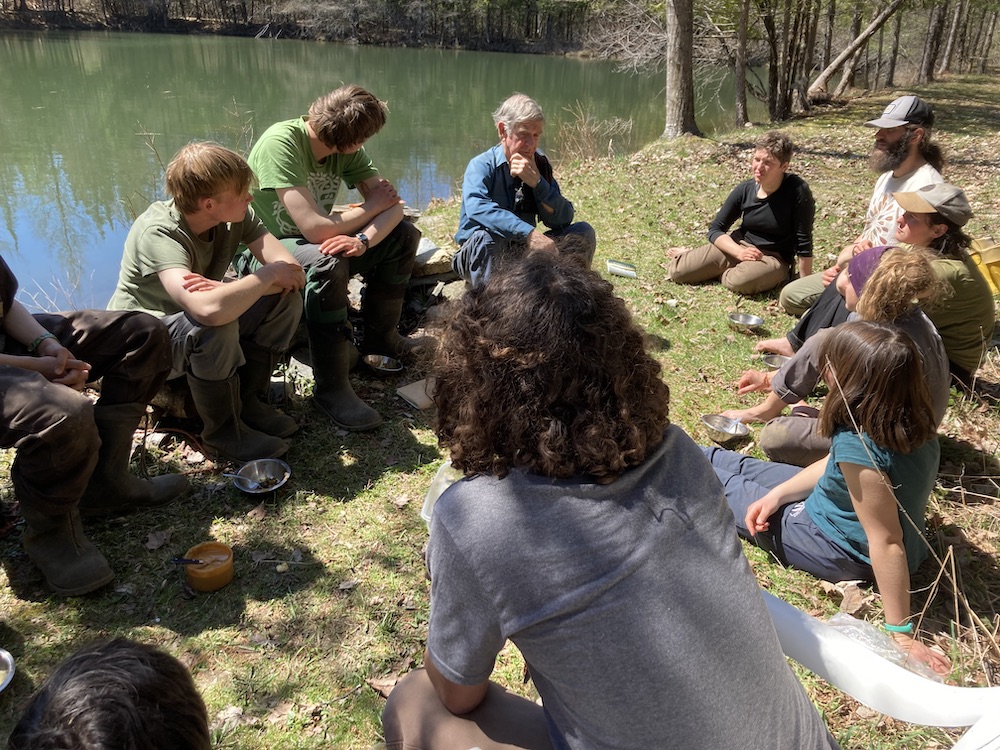 After eating, Grandfather led us through his woods; up the creek, through the mill, past a massive locust tree, its craggy, woven bark forming long, deep crevices and jutting ridges. We stood at its base, in awe. Three of us holding hands could barely wrap around it.
After eating, Grandfather led us through his woods; up the creek, through the mill, past a massive locust tree, its craggy, woven bark forming long, deep crevices and jutting ridges. We stood at its base, in awe. Three of us holding hands could barely wrap around it.
We entered the forest with a need: a straight Ash log that we could pound into strips. We combined our need with the forests, searching also for a tree that perhaps was crowded, and its clearing could open up space for others to flourish. We settled on two that suited our needs, and began the process of felling.
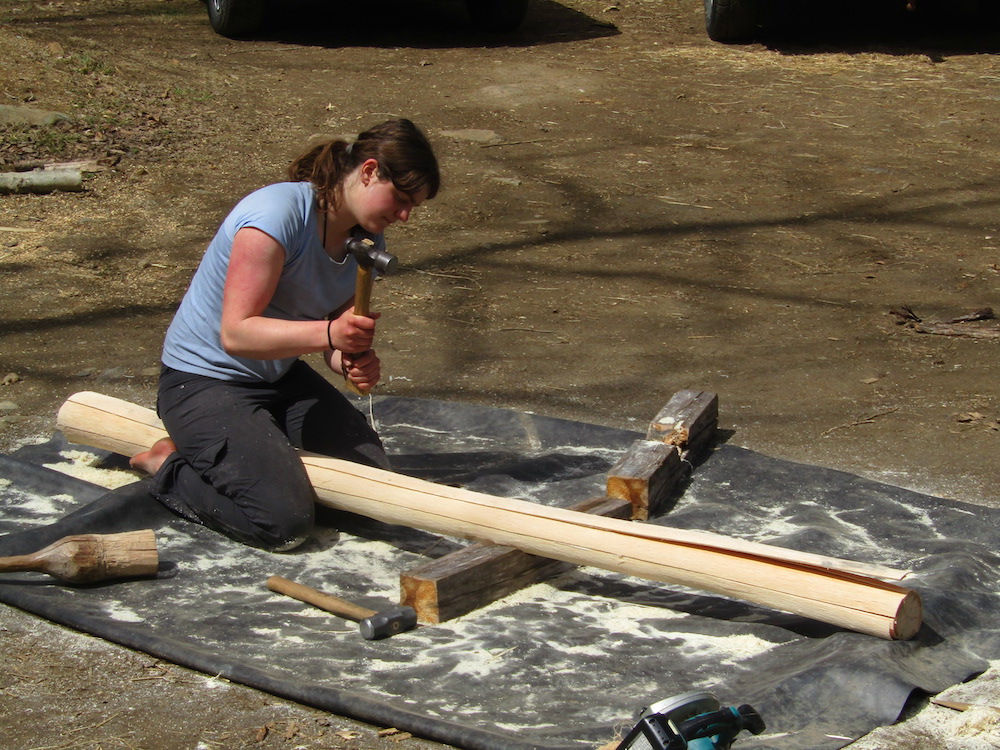
Lily pounding ash
“It was a powerful thing to stand at the base the tree and look up at the branches, and then crouch low and lean my forehead on the trunk, knowing that we were going to take its life in order to make baskets. The gratitude I let flow from my heart to the tree was not as deep and nuanced as the gratitude I now hold for that same tree. As I watched the tree fall, something tugged at my heart, I knew I now had a debt to repay. I pondered the significance of that debt as we began the shift from tree to usable materials. Pounding the log was deeply cathartic. Between learning to wield a hammer and mallet with precision and skill and walking the line between over and under pounding, many hours were spent fully engaged, mind and body. The emotional outlet of the meditative task combined with the excitement that rose in me every time a strip popped up kept me content. When I was working alone I honored the work, and therefore the tree, best, and holding that while working with others was difficult. As I pounded I was aware of the years of life, the sunlight and water I was stripping away. Honoring the tree by making materials that were as high quality as possible felt right deep in my soul. The next step, stripping, was not as easy. I lacked the skill to do it well without waste. I felt like I was failing the tree when I rendered a strip useless. It was humbling, frustrating, and showed me how much I have to learn. It made me think about mastery and time.” -Addie
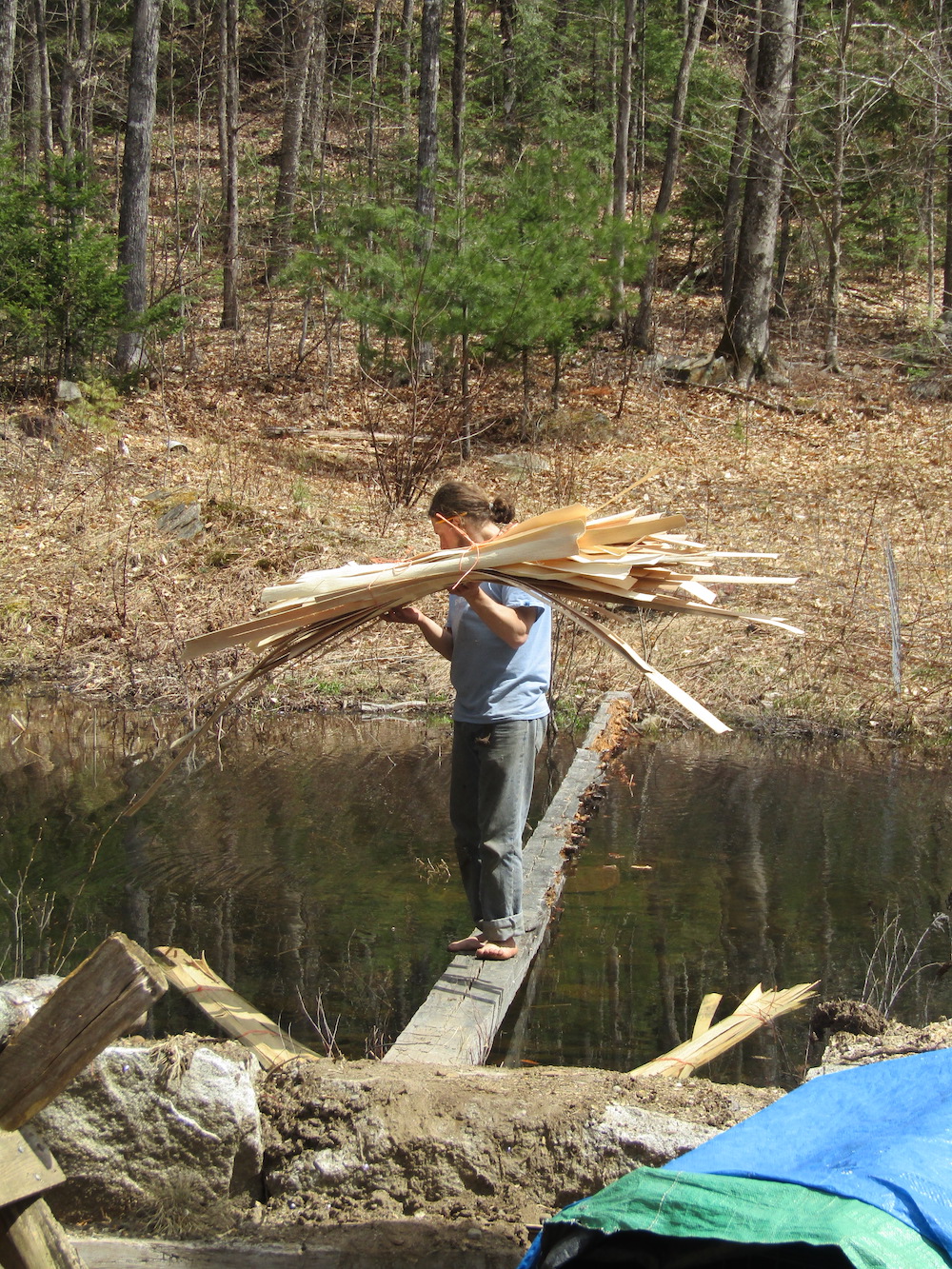
Max soaking splints
At last we were ready to weave, but first we had to make our skids. We used a froe to split rectangular planks from cedar rounds, then shaped the skids with a shave horse and drawknife. Next we wove the bottoms and attached the skids. Weaving a basket requires two kinds of splints.
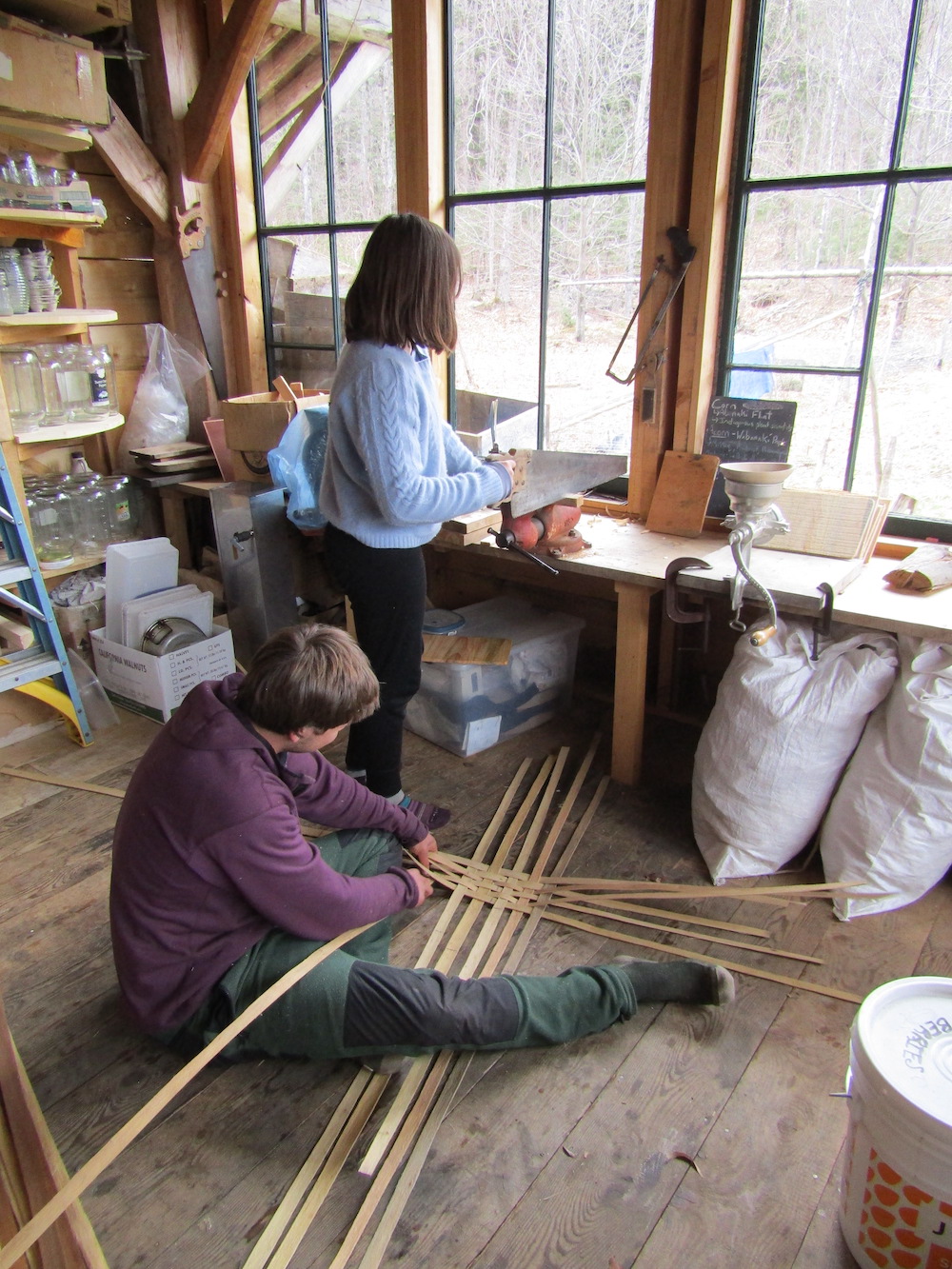
Ben S and Miriam working on baskets
Weavers, which are thin, easily bendable strands, and uprights, which are far wider and thicker and not so easy to bend. The process is as follows. Your uprights are the skeleton and determine your baskets shape, and are, as their name states, vertically positioned. While they are wet and still pliable, you can shape them to allow your baskets to have curves of different sizes and intervals. The weavers go in between the uprights, interlocking their pattern by going in front and behind them.
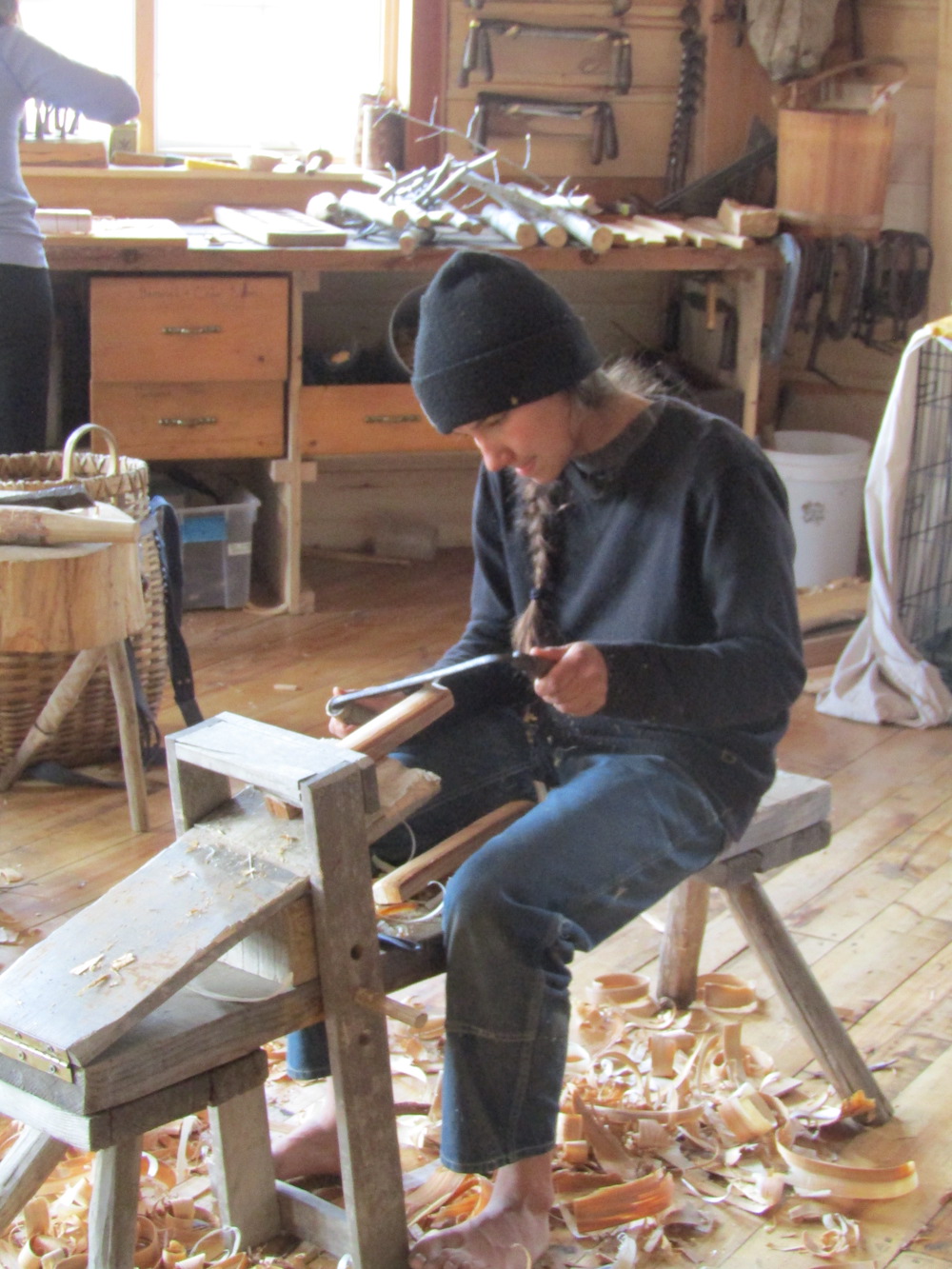
Addie crafting skids
The weaving itself was initially quite frustrating for me. The further I got, though, the more I learned to work in harmony with the materials, not trying to bend them to my will. It’s a delicate process. I started to fall in love with the rhythm and with watching my basket take shape in front of me. I was putting so much of myself inside it, so much energy into making something wholly unique. It’s not just about interweaving the random strands of wood, it’s about an incredible relationship that builds over the course of creation. By the end, the connection between the basket and me was unbreakable. Basketry is a beautiful art that should be experienced in some form by as many people as possible.
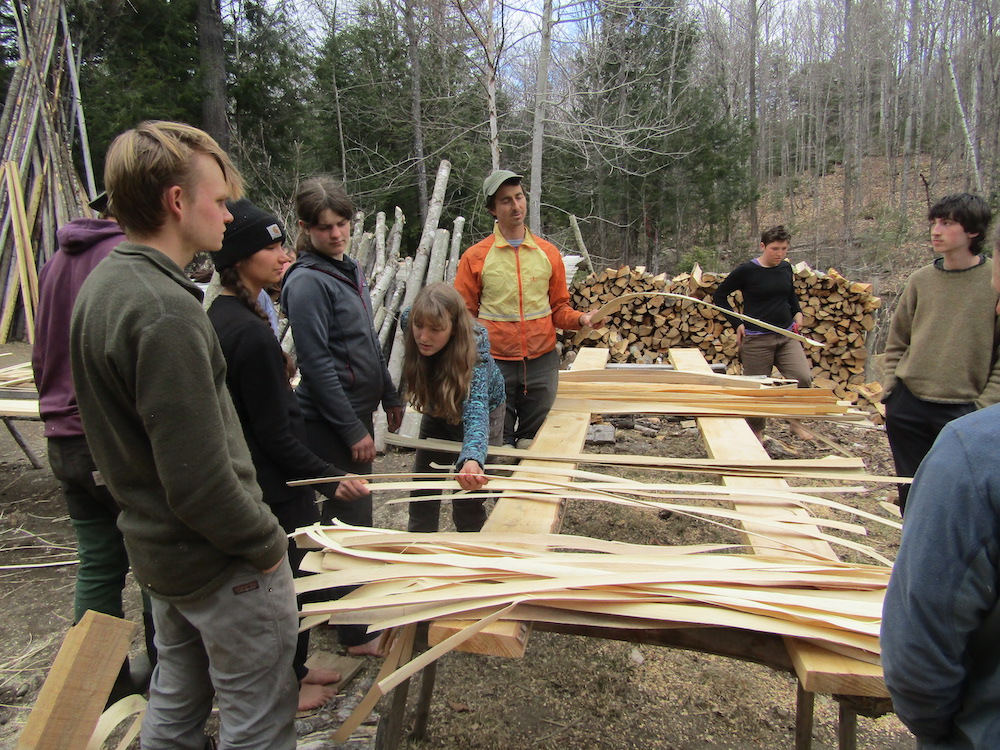 The basket project was part of a larger block that involved forestry, acorn processing/agroforestry, forest hydrology, sap flow and cold strategies of trees. We learned how trees lift water hundreds of feet, how forests both make and conserve rain, and why some trees can be tapped and others, though they have sap, would not give any to a human with drill and spile. We learned to make decisions when working in a forest and how ask, “Who is the future” of this forest. We learned to turn small logs into mushrooms and how the spring growth strategy of oak and ash make them the most suitable for pounding into basket material.
The basket project was part of a larger block that involved forestry, acorn processing/agroforestry, forest hydrology, sap flow and cold strategies of trees. We learned how trees lift water hundreds of feet, how forests both make and conserve rain, and why some trees can be tapped and others, though they have sap, would not give any to a human with drill and spile. We learned to make decisions when working in a forest and how ask, “Who is the future” of this forest. We learned to turn small logs into mushrooms and how the spring growth strategy of oak and ash make them the most suitable for pounding into basket material.
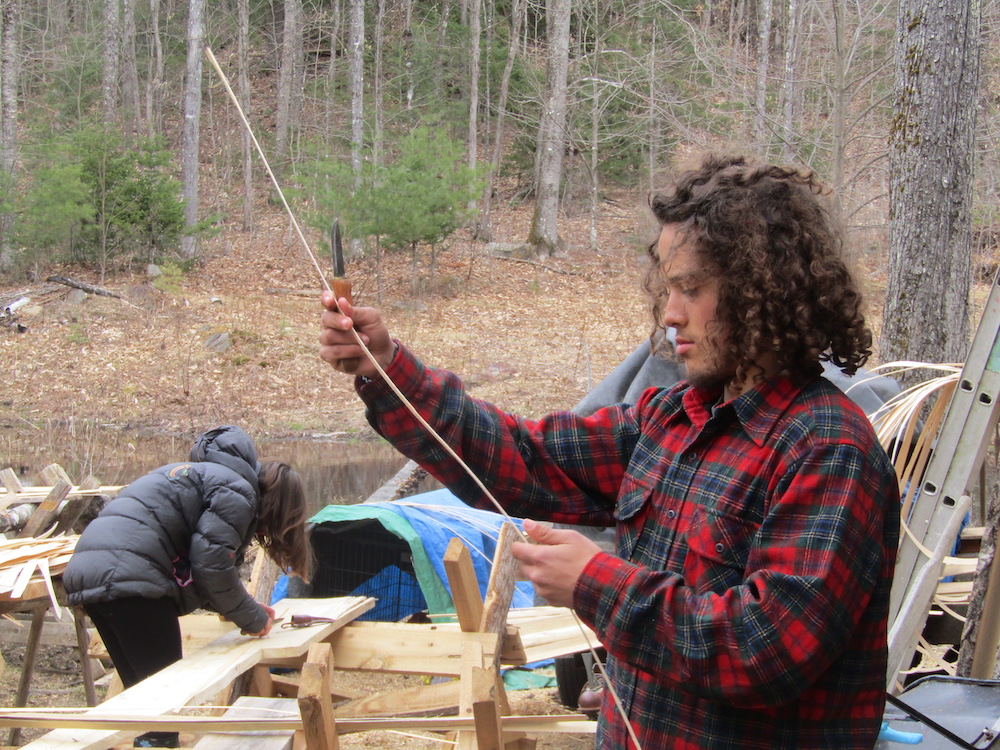
Arnett making splints
I now have a sense of pride and curiosity. If I can make something beautiful like this, what else am I capable of? I hope when I am 60 I can look at my basket and wear it and remember everything that is in me now – that is in the basket. I hope it stays as a precious reminder of this semester, this chapter in my life, even just this sunny month at MLLS when the red maple buds looked royal in the sun-kissed evening light. – Aria
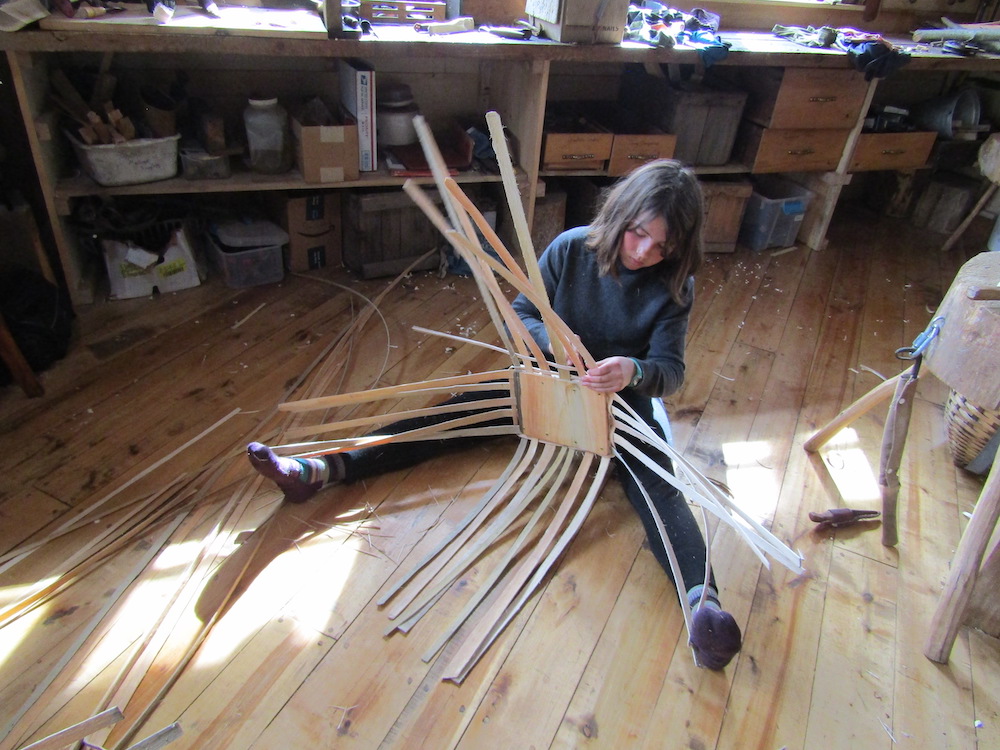
Miriam weaving
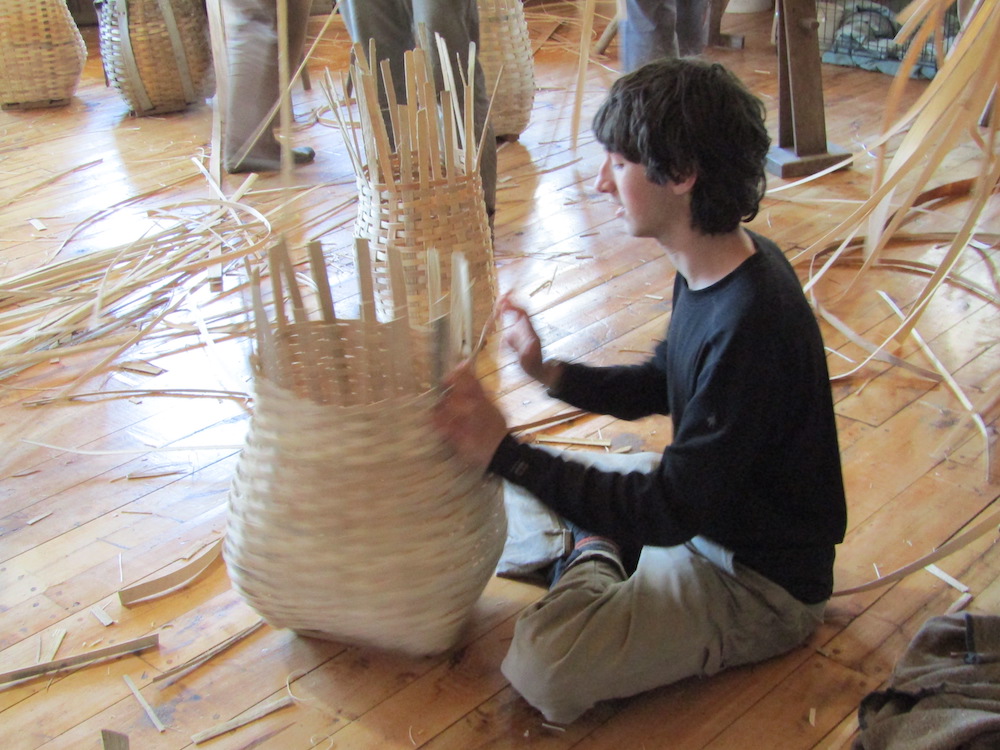
Russell weaving
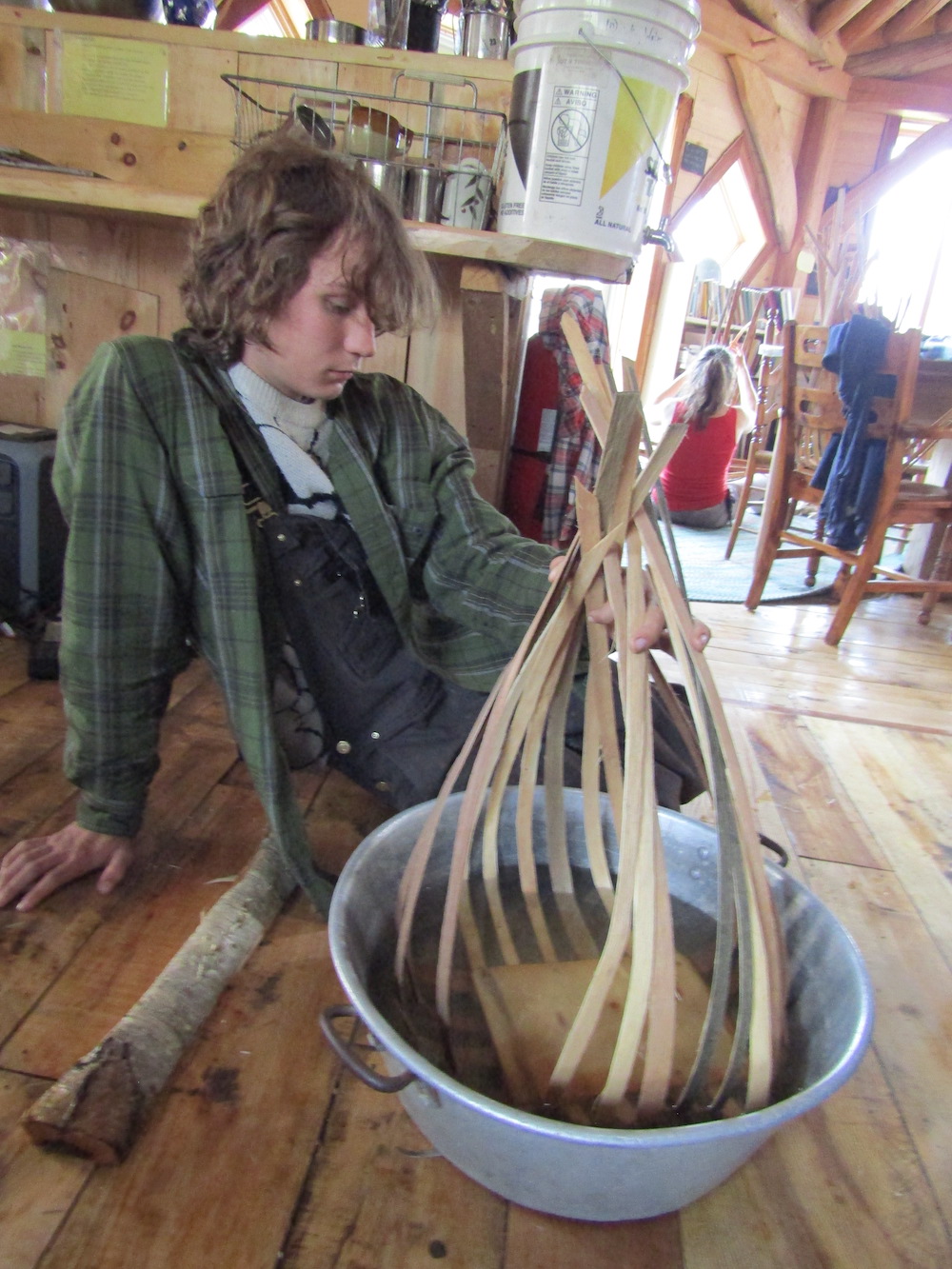
Ben H soaking the splints for weaving
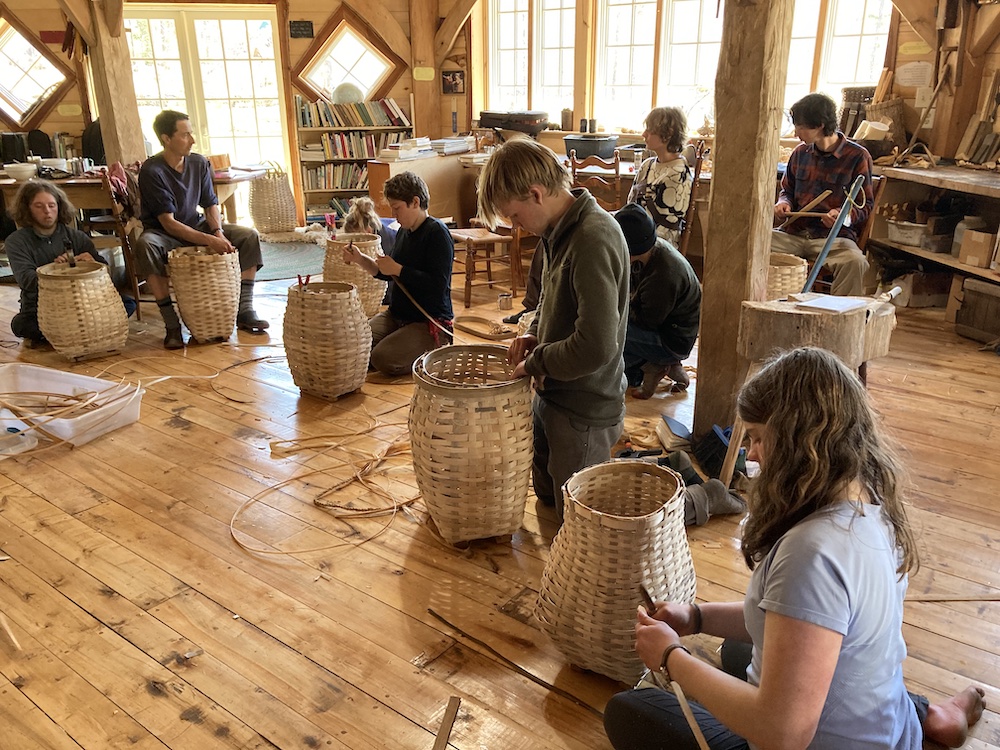 ___________________________________________________________
___________________________________________________________
Before the basket project we had another rite of passage, individual solos. “On April 21st, we set out on a 1 day, 2 night (36 hour) “solo” on the Maine Local Living School land in spots that we each chose, locations that called uniquely to each of us. The intention of this experience was not to “survive alone in the wilderness”, but rather to sit with the Earth and listen to what arises within. Due to our distracting anthropogenic ways, the world we live in has shifted away from noticing and just being; solos are a sacred practice to remember ourselves into a more than human world.” – Aria
“And right then as if it had been waiting for me, every fear and failing, every need and despair of this whole journey rushed in to be felt all at once. There was no sitting in silence, only speaking and weeping, laughing and crying until it had all been told to the rocks and trees.” – Lily
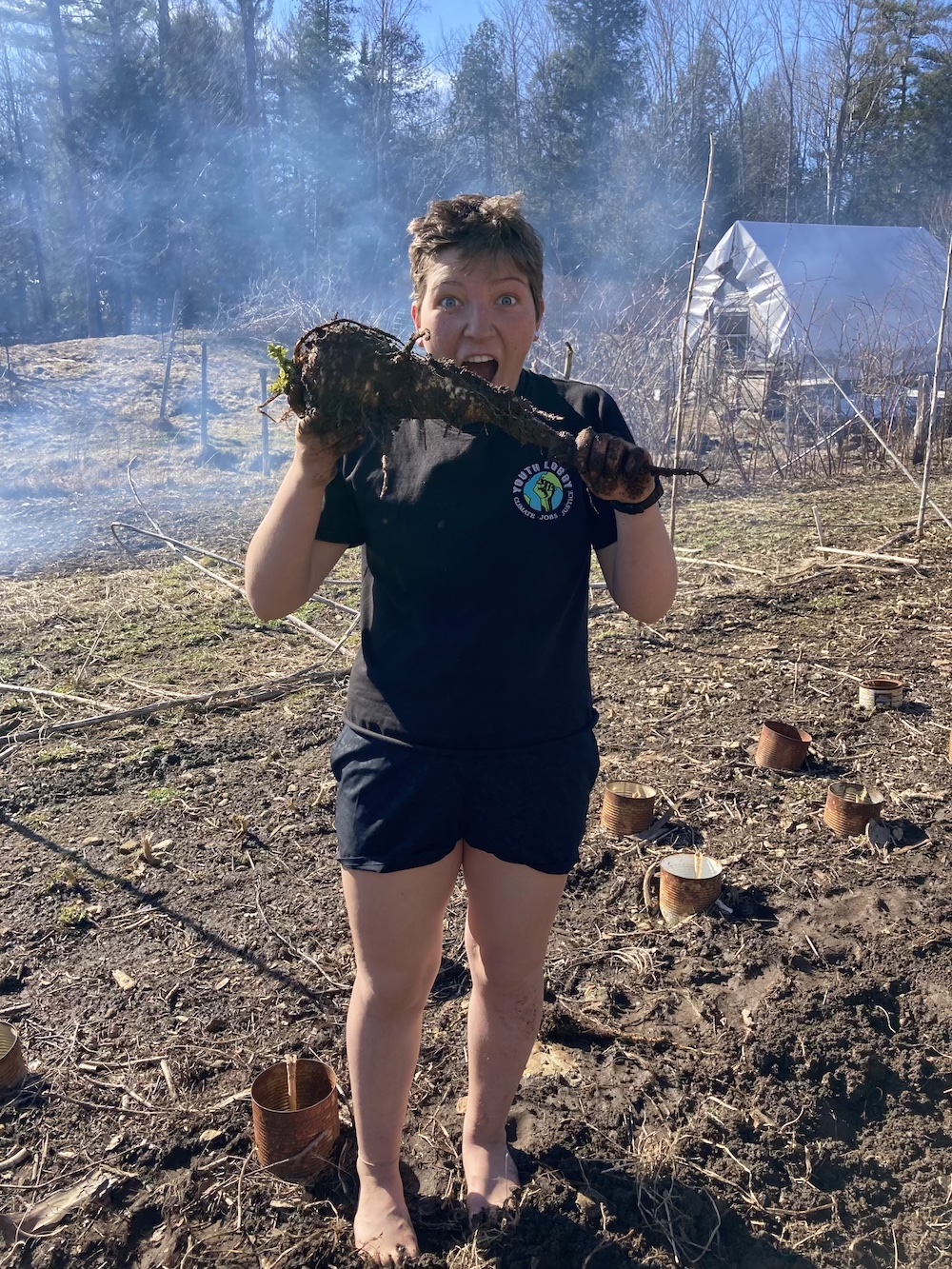
Una and the parsnip
“It was humbling how much the wind affected me all day. It was amazing to sit in the momentary silence between gusts. Solo was hard, amazing, and beautiful.” – Una
“I felt so connected to the pine. Breezes that shook its needles brought with them old memories, memories I hadn’t recounted until then. Watching the light dance through the needles gave me a sense of calm through it all.” – Miriam
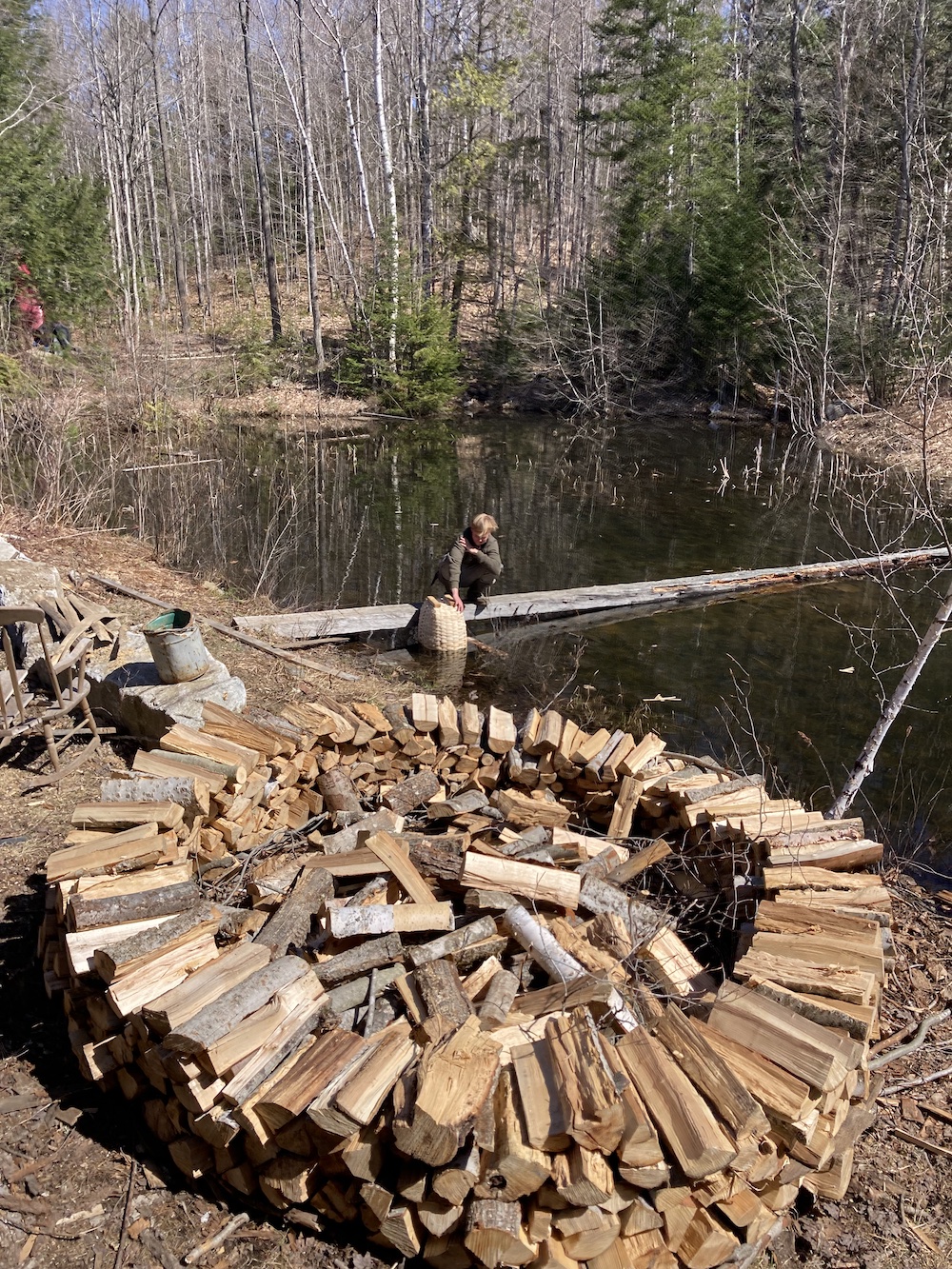 “I lay still for those 36 hours, looking up – up at the red maple blossoms and how they changed to my eye as the sun and the full moon arced over me.” – Aria
“I lay still for those 36 hours, looking up – up at the red maple blossoms and how they changed to my eye as the sun and the full moon arced over me.” – Aria
“We had gone, then returned, all of us, one group.” – Max
“The air was incredibly still, and the forest was so, so quiet. I felt a very powerful sense of belonging there.” – Russell
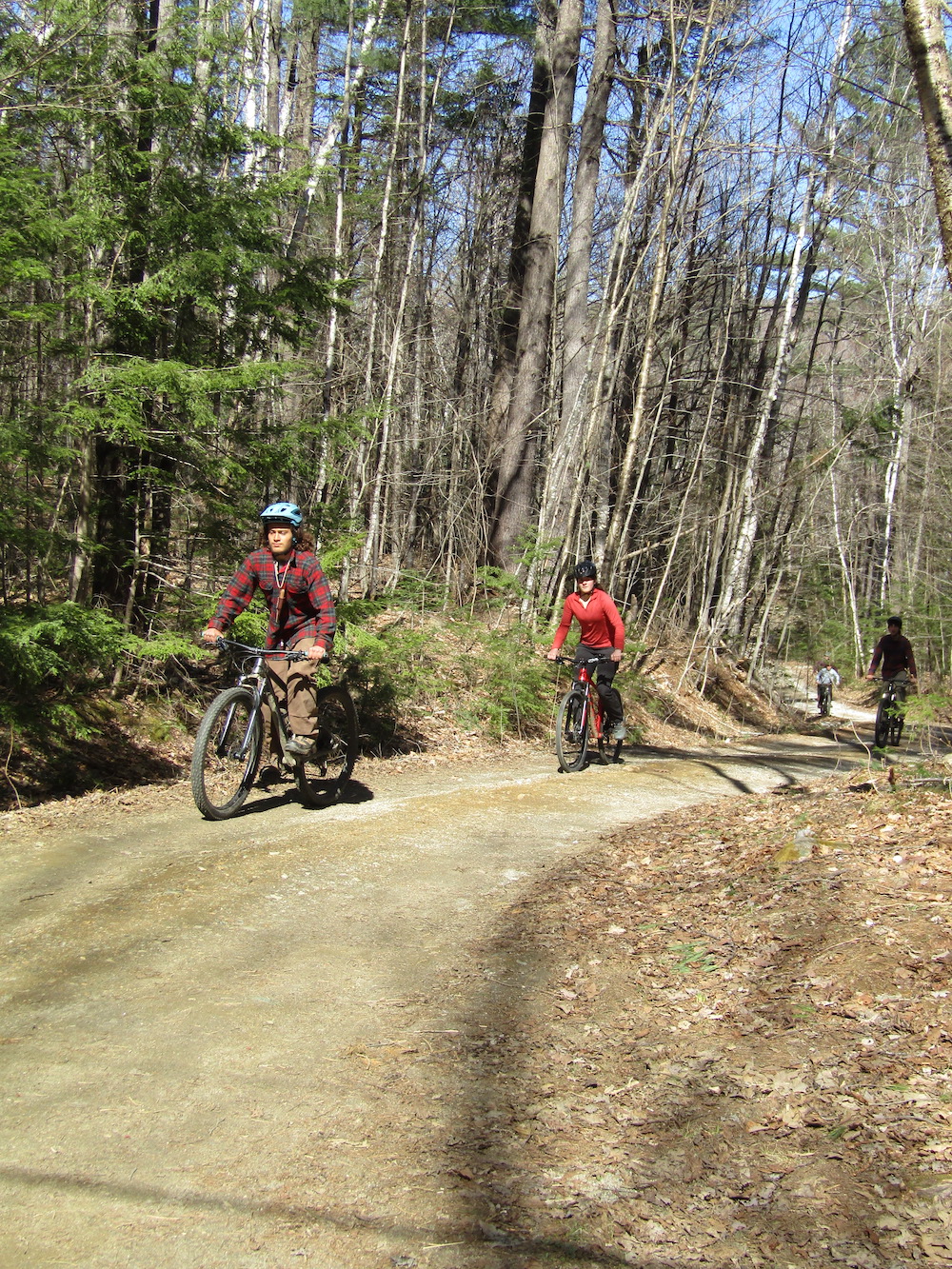 “Sometimes it just takes 36 hours of sitting to realize who you are inside.” – Ben Saunders
“Sometimes it just takes 36 hours of sitting to realize who you are inside.” – Ben Saunders
“A pound of kasha and pasta and hours of sunlight creates a chill atmosphere.” – Thomas
“On solo I went chasing firewood that was out of sight, instead of receiving the gifts that I was given right in front of me.” – Ben Holcomb
“The moon and the sun moved above me and I felt that I was a part of the world and the forest, and not at all separate from me or the trees or anything.” – Addie
“I will always remember how these amazing creatures were willing to reveal themselves, and especially the beavers, seemingly more comfortable with my presence as time ebbed on.” – Arnett
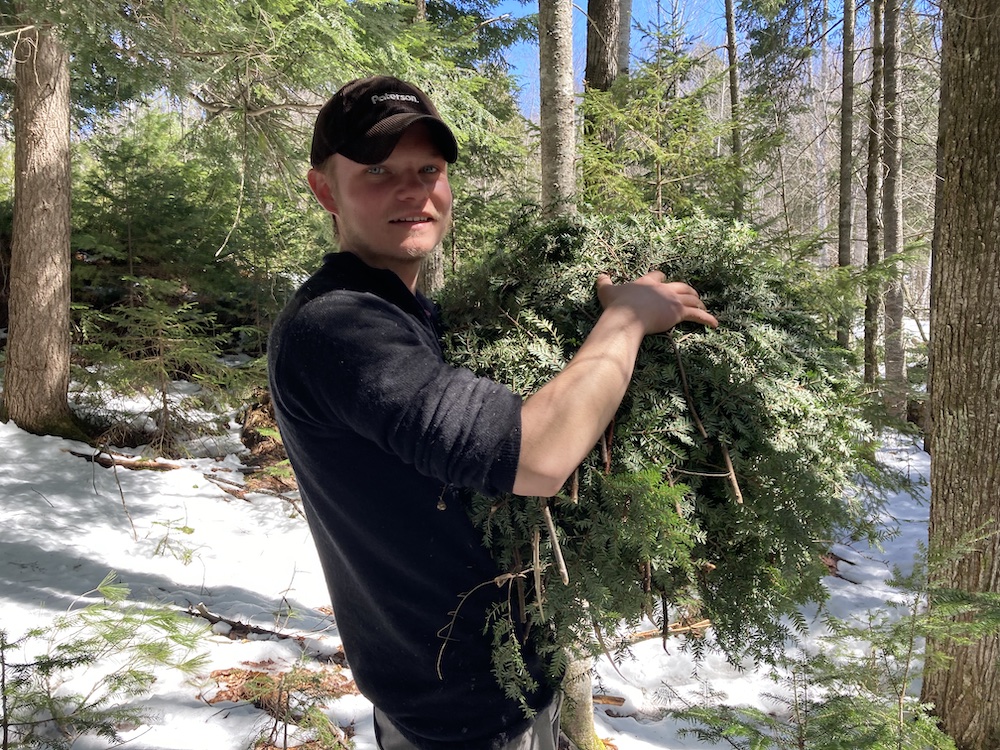
Thomas gathering boughs
___________________________________________________________
Fiddlehead
In the days leading up to our departure on our spring expedition, we had one last event: the Fiddlehead Local Foods Festival! Bustling booths, live music, and the hourly Root Veggie Parade lent an atmosphere of lively earthiness to the whole affair.
Tents lined crowded walkways, boasting such things as local syrup, a fiddlehead cooking demo, dandelion cookbooks, and in one odd (and perhaps not so local) case, CBD-infused Emu Oil!?
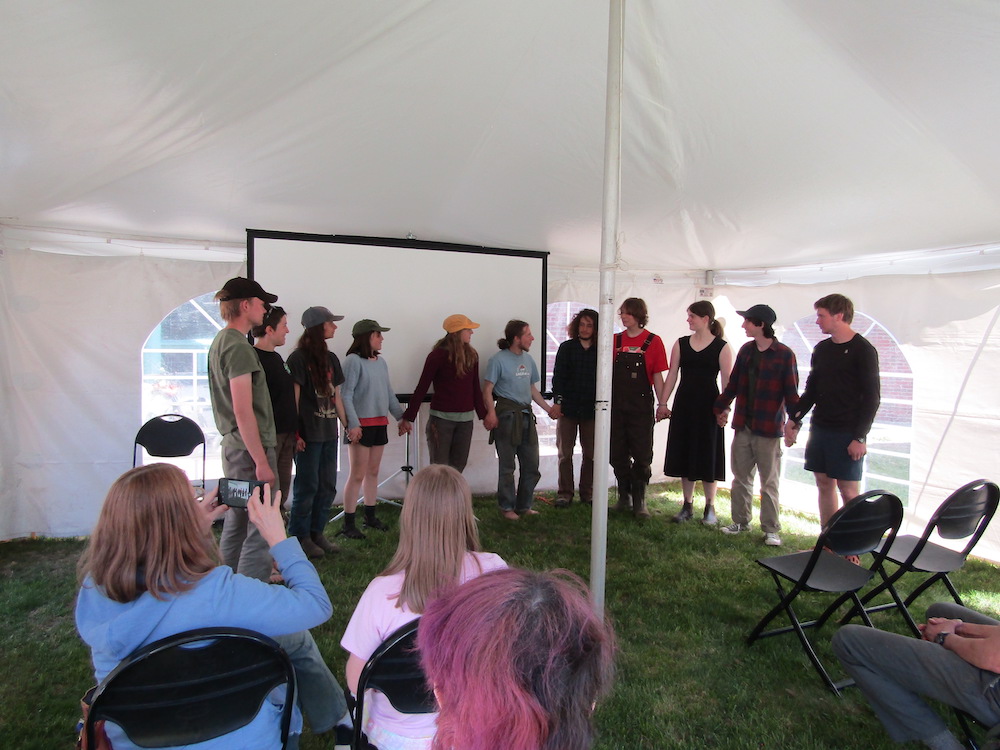 We did not arrive unprepared; an acorn cracking and grinding station was set up, and we welcomed kids and adults to come try the process. We fried a steady stream of tiny acorn cookies on a rocket stove. And shiny Kroka fliers were placed conspicuously on the table next to info about upcoming community events at MLLS.
We did not arrive unprepared; an acorn cracking and grinding station was set up, and we welcomed kids and adults to come try the process. We fried a steady stream of tiny acorn cookies on a rocket stove. And shiny Kroka fliers were placed conspicuously on the table next to info about upcoming community events at MLLS.
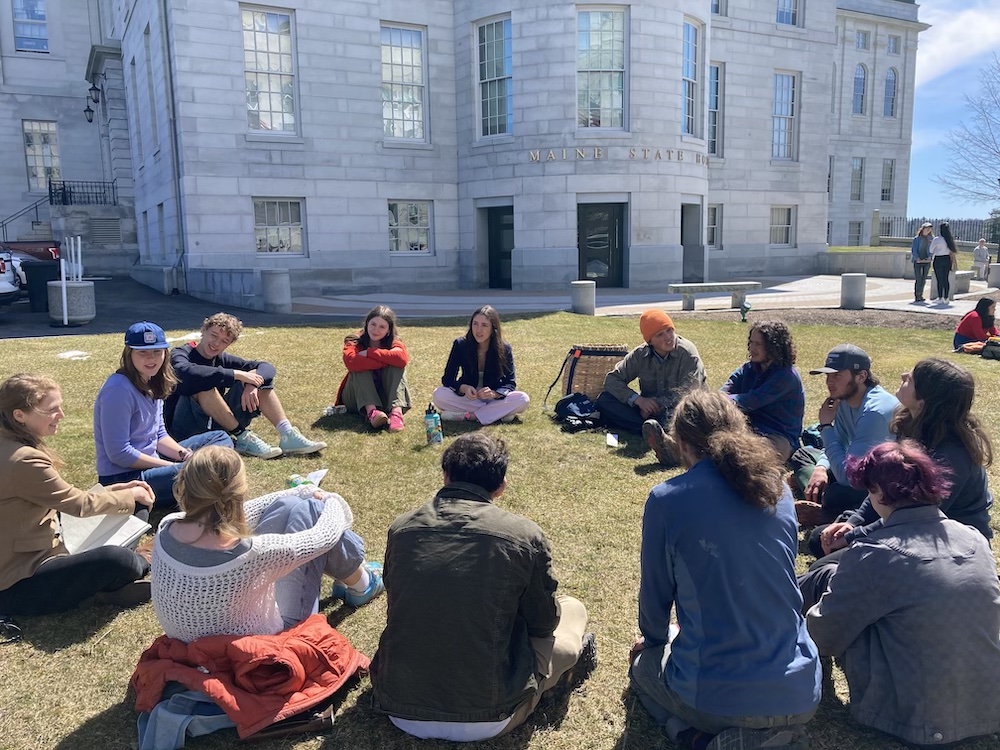 While waiting to give our tent talk, we were privileged to hear the illustrious Nicholas Repenning speak about his adventures in fermentation. He told us about his own journey to find fermenting, its history, and all of the projects he had going, from kimchi to sauerkraut. We learned that he grows his own culture on rice to make miso, which he produces several 50-gallon drums of in the space of a few weeks each year. He has yet to have anyone take him up on his offer of a “miso bath!”
While waiting to give our tent talk, we were privileged to hear the illustrious Nicholas Repenning speak about his adventures in fermentation. He told us about his own journey to find fermenting, its history, and all of the projects he had going, from kimchi to sauerkraut. We learned that he grows his own culture on rice to make miso, which he produces several 50-gallon drums of in the space of a few weeks each year. He has yet to have anyone take him up on his offer of a “miso bath!”
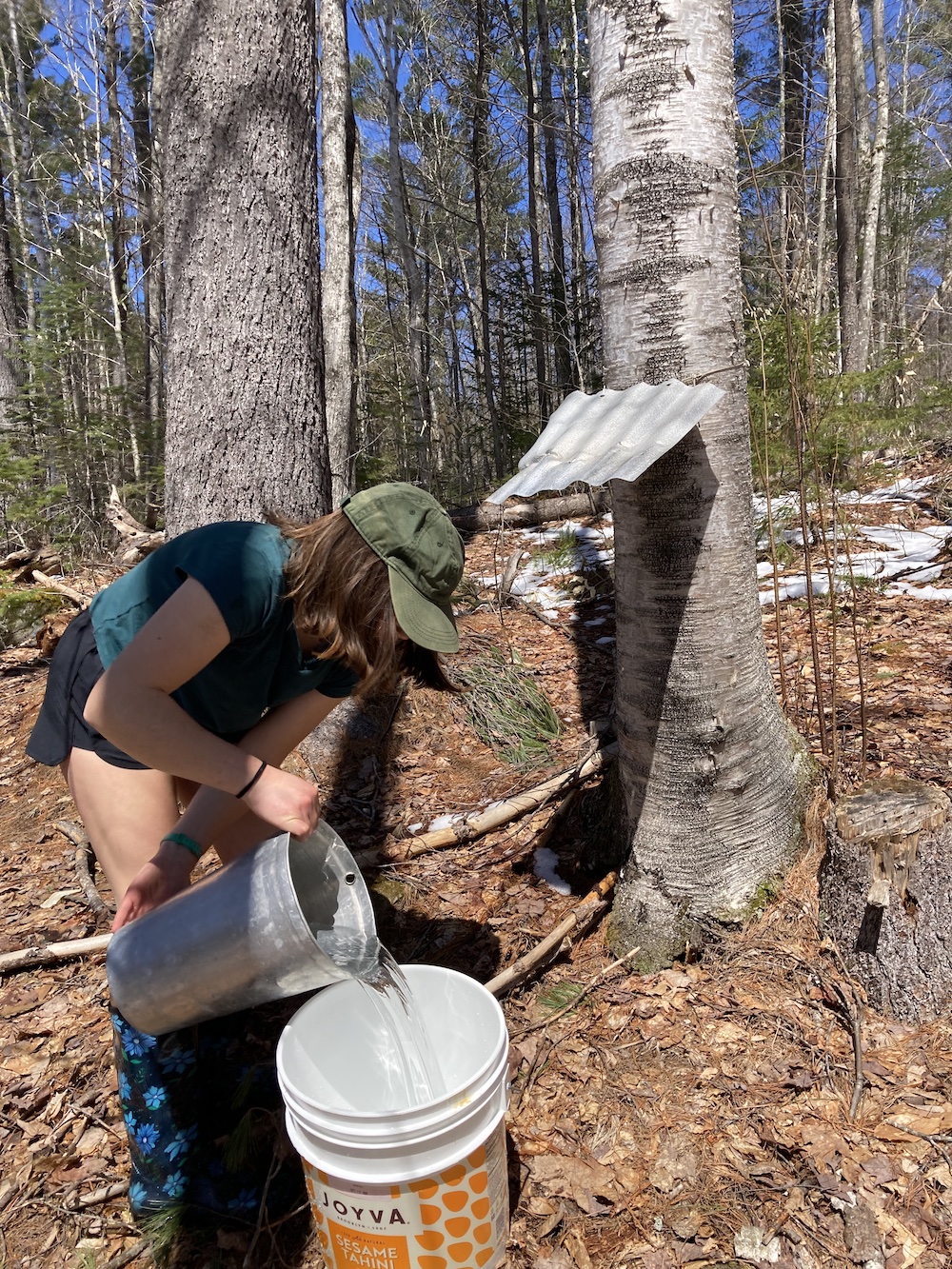
Miriam collecting birch sap
We gave our own tent talk, which involved a very silly skit and then a presentation about our consumption of local foods on trail and at MLLS, finishing off with a Q&A. Thomas spoke about Birch versus Maple Syrup in stores: “You won’t see Birch Syrup in supermarkets because it doesn’t taste very good.” Little did he know, Chris’s neighbors and some of the foremost Birch syrup producers of Maine were sitting in the audience! Afterward, they gifted us with a bottle of birch syrup as a peace token.
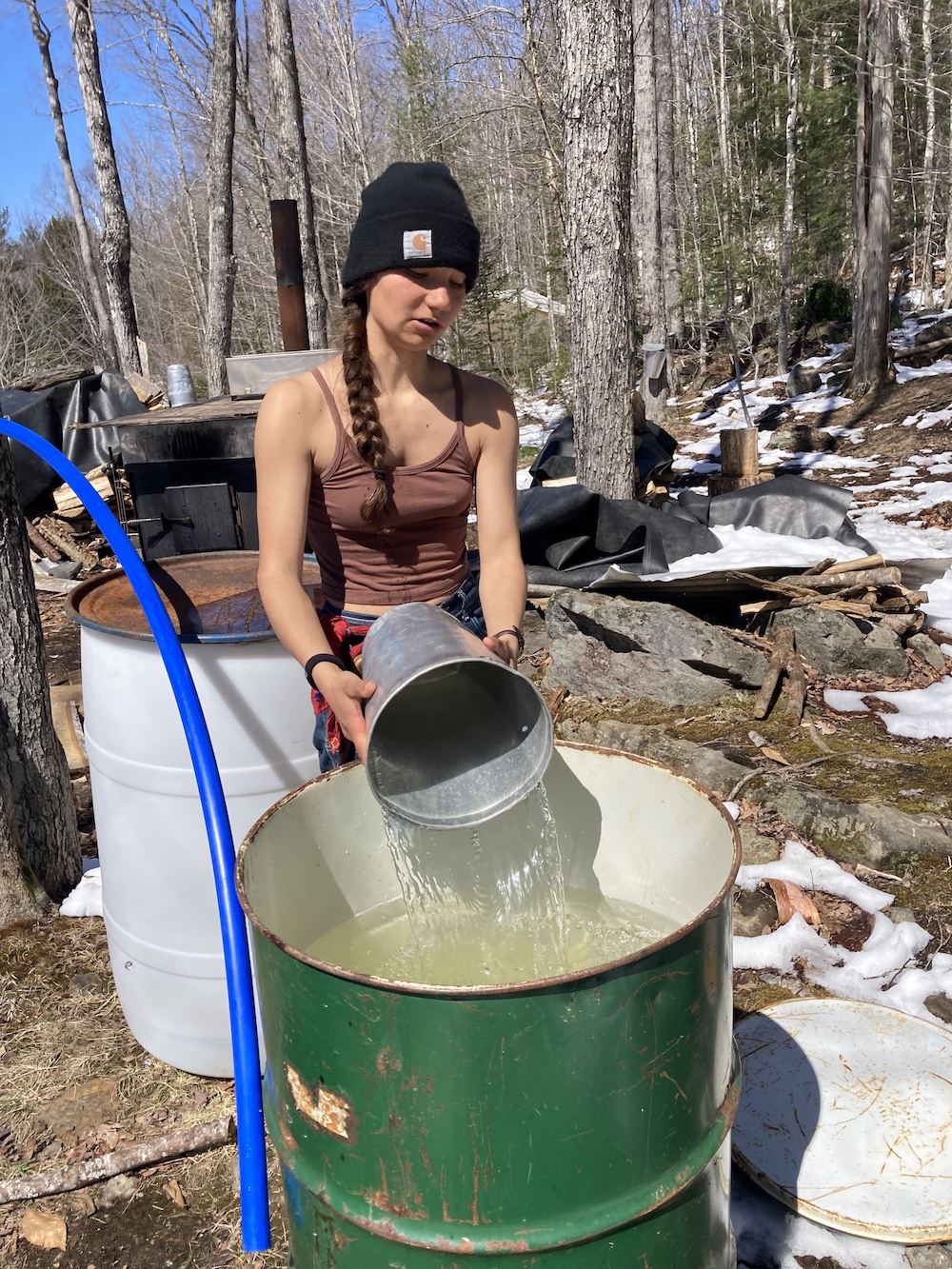
Addie gathering birch sap
The rest of our time there was spent wandering around the booths, talking to local growers, artisans and conservation groups. A few of us wandered over to the neighboring “Beaver Bash” festival, where Tashi, Caleb, and Una made beautiful tie-dye t-shirts.
We met so many interesting people that day, and learned so much! We even received Fiddlehead t-shirts for participating in the festival. It was a lovely day spent in the sun, sharing, learning, and connecting with the local community. To cap it off, we had a swift bike ride home with a pit stop to swim in the beautiful Temple Stream.
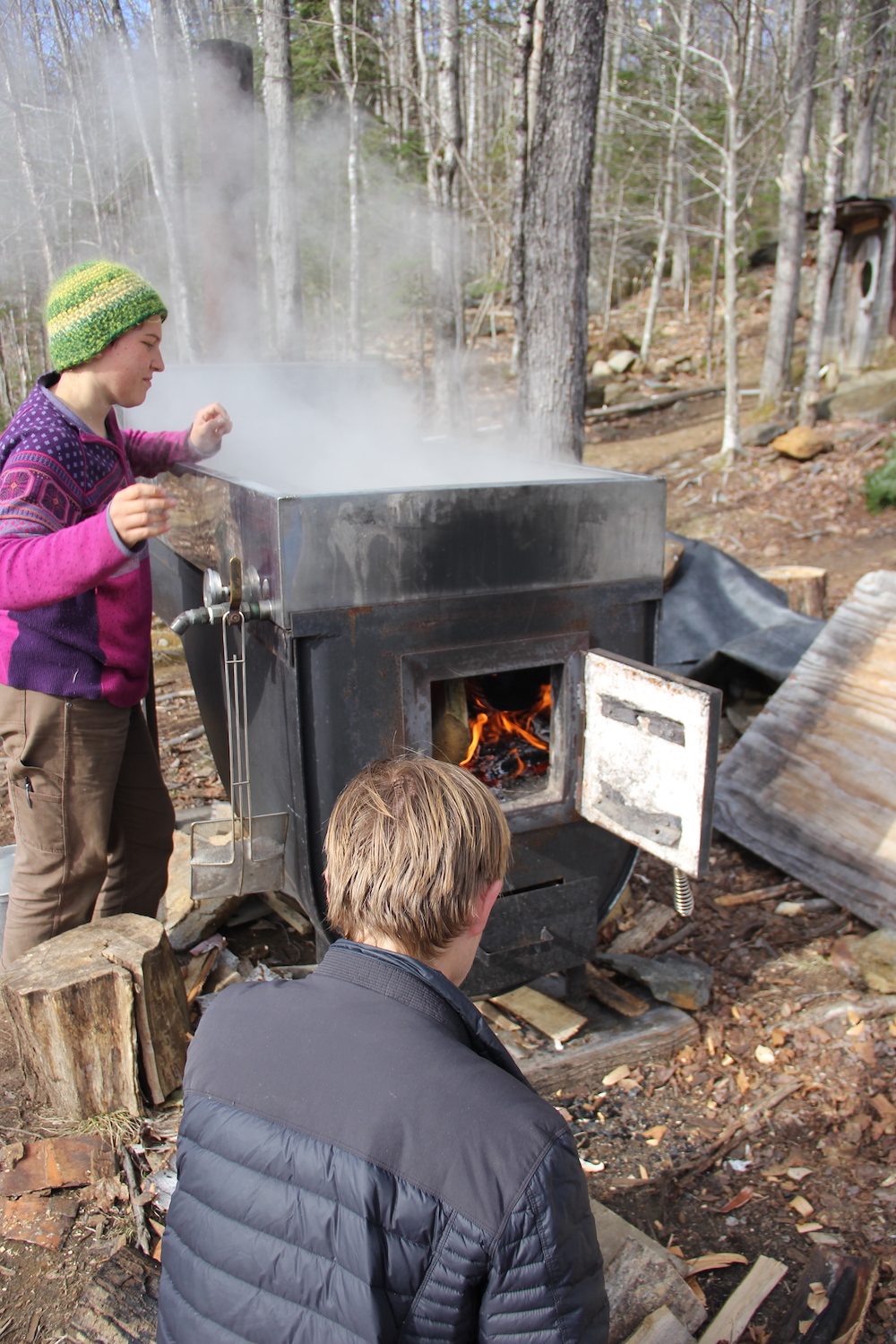
Una and Thomas boiling sap
___________________________________________________________
4/26/24, Day 103 of Semester, day 27 of MLLS.
Small cirrus clouds all day- hazy blueish sky (a bit confused, was expecting rain today)
Waning moon – gibbous
…..The whole circle felt so lovely. Everyone has grown individually, and we have grown as a group so much- now able to communicate and share clearly and honestly while holding and loving each other. We sang in the candlelight, I felt so much love for the group. When I was all tucked into bed in the wall tent we heard guitar notes. Chris, Nick, Tashi and Michelle were outside on our porch to sing us goodnight. I’m not sure if the gesture of it made them sound even better, but it was the most beautiful song. Their voices blended together like silk, I cried and felt so loved and cared for. I wanted the song to never end. One of my favorite moments from being alive…..
(Excerpt from Aria’s Journal)
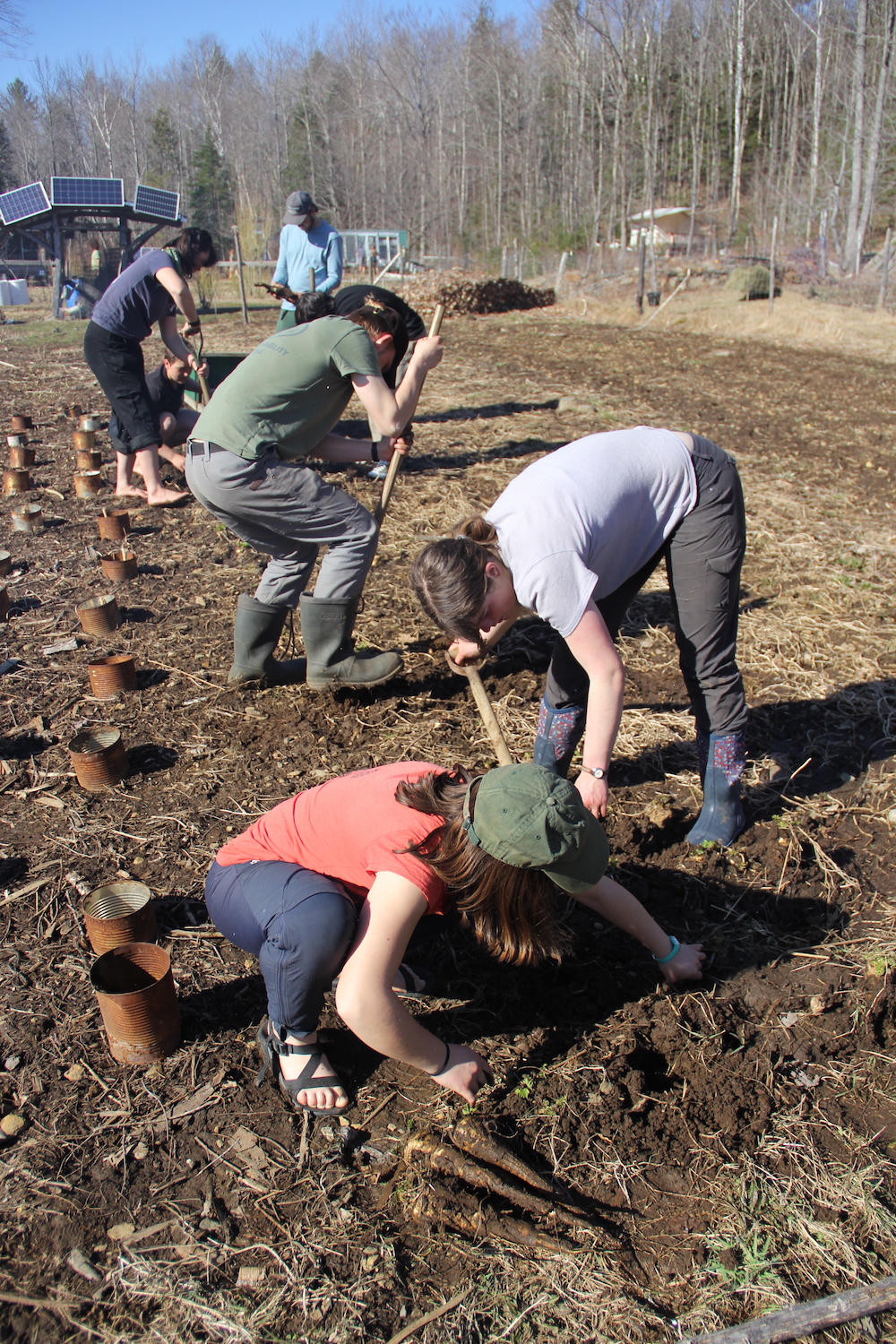 ___________________________________________________________
___________________________________________________________
We have cherished our time at Maine Local Living School. So many skills learned and people met. We are so grateful to Chris Knapp and his family for inviting us to stay at their beautiful home. It is now time for the next step in our journey, paddling along the Sandy and Kennebec rivers. So many new things to learn and see, so many new systems to adjust to. We can’t wait for the next chapter in our adventure.
Until next time,
Your scribes,
Arnett and Max
